Blogs Are Dead. Long Live the Blog.
Published by Tyler Hakes on April 24, 2025
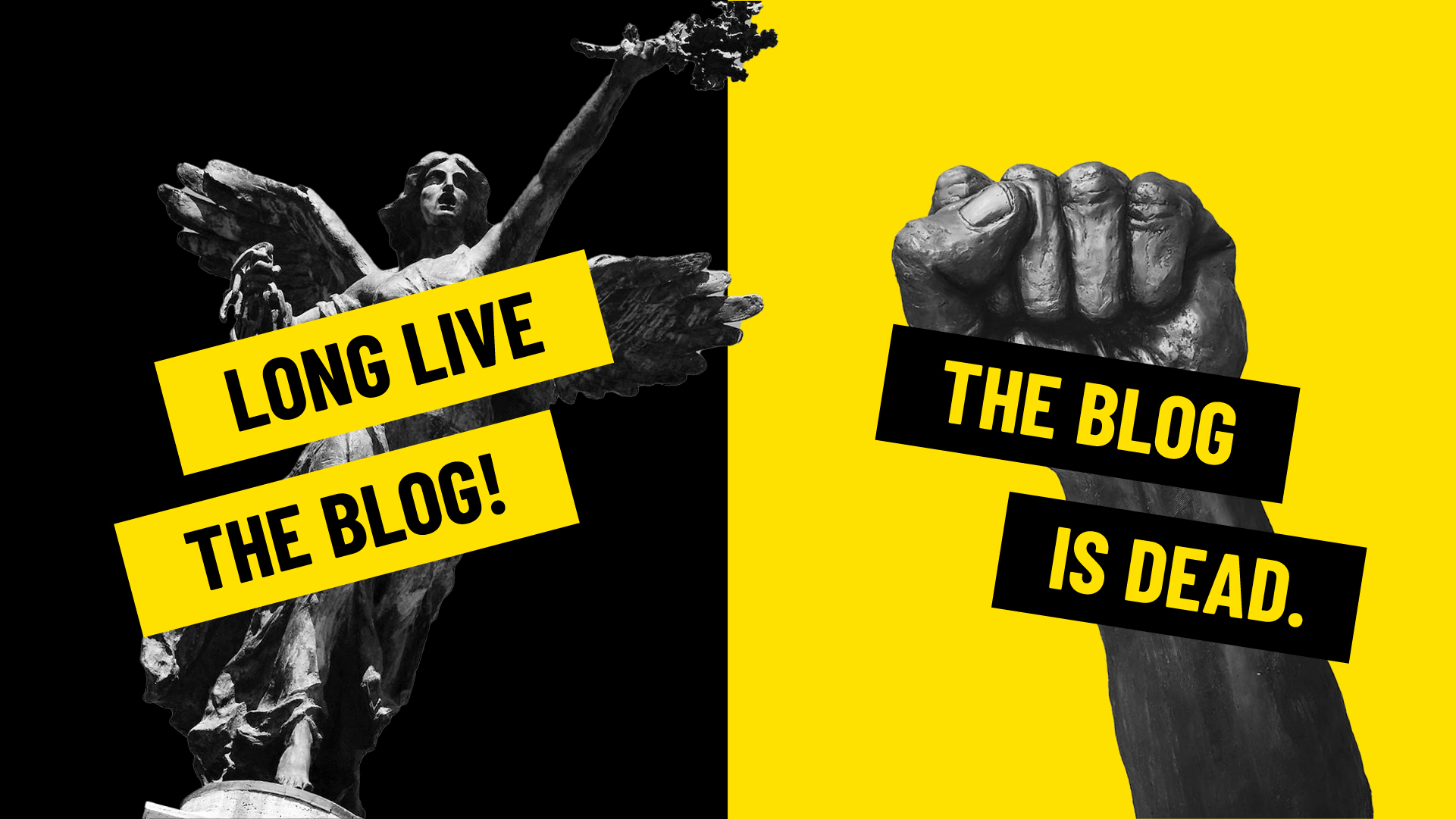
Content marketing is in an existential crisis.
You can feel it.
I can feel it.
The things that worked consistently for years and decades are now less solid.
The playbooks that nearly every company used to grow traffic and revenue (primarily through SEO) feel outdated and inadequate.
And it’s not clear what playbooks will replace the old one.
Or if there’s a replacement at all.
I wrestled with this for the entire quarter.
As I noodled on our content marketing strategy, I banged my head against the most foundational questions:
- Should we bother gating content?
- Do we even need a blog?
- What’s the point of content at all?
It led me down a lot of winding paths. But, ultimately, it forced a lot of clarity about the state of content marketing and our path forward.
So let’s get to the answers.
Should We Bother Gating Content?
No.
We’re planning a number of large-scale content resources that would generally be offered as a gated resource or PDF in exchange for an email address.
But we’re not going to gate them.
The traditional inbound model — with gated content, emails, case studies, etc. — assumes that with the right sequence of events and breadcrumbs, you can nudge buyers along their own journey.
But can you, really?
Maybe with the right technology and orchestration, it’s possible.
But we don’t have that. We operate a simple content marketing strategy that is mostly focused on building authority and affinity within our space. It’s not a sophisticated machine for turning buyer intent signals into piping-hot leads.
Plus: It’s not our journey.
It’s their journey.
We may be able to influence it.
But we can’t control it.
So we’re not gating content.
Do We Even Need a Blog?
No. But we’re going to have one, anyway.
Should we just skip publishing content on our website at all and go straight to native formats like LinkedIn and YouTube?
Other than SEO purposes, there’s no reason content needs to live on your website. And, in fact, it’s actually less effective and efficient to put content on your website than to package it directly for native platforms like email, LinkedIn, or Reddit.
(Just to be clear, I am not saying content is a waste of effort. I’m just pointing out that the idea of having a “blog” on your site where all your content lives is basically an antiquated model.)
If I were a purely rational person, I wouldn’t bother having one.
But I’m not.
I’m a real human being working a real job and juggling a real life.
Humans are not purely rational.
We’re messy.
We’re inefficient.
We’re petty, illogical, and distracted.
So we’re going to keep our blog.
Why?
Because, for most teams, long-form content is the most natural anchor for the entire strategy.
Let’s say you want your strategy to start by drafting native content for LinkedIn without drawing from existing source material like a blog post or guide.
It feels oddly untethered.
It feels like it’s time to start flinging ideas at the wall.
But if you tell someone to work from an existing piece and draft native social content drawing from its core ideas, they know exactly what to do.
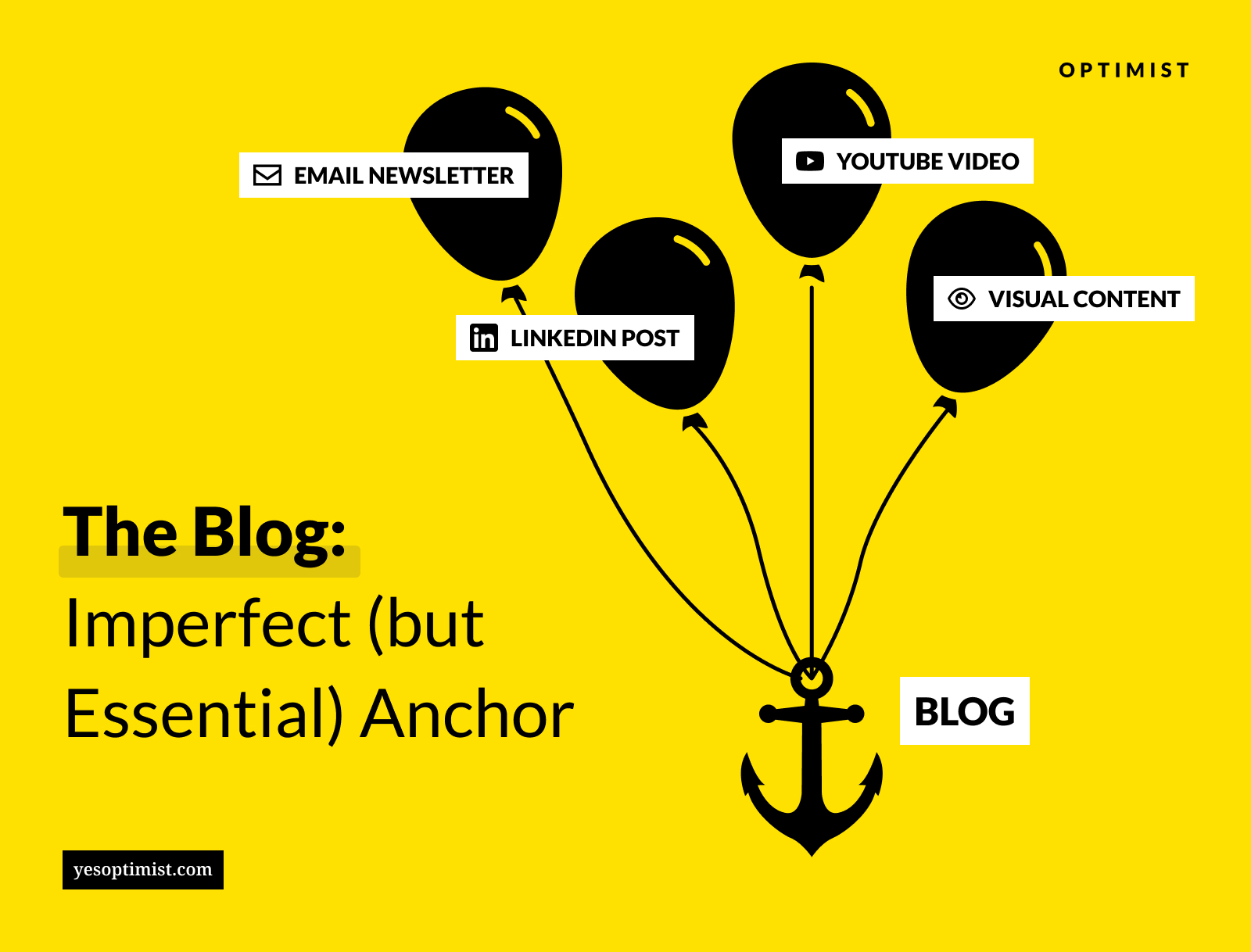
Long-form written content is a vehicle to shape the big ideas that your team is focused on communicating. And to draw boundaries around the strategy — to anchor it to a clear direction and focus.
There’s no logical reason this must be the case.
But it’s the reality of marketing.
So, rather than trying to prescribe some “perfect strategy” that’s more ideal in theory but unattainable in practice, we’re going to find a solution that considers the practical and functional realities.
We can be more effective by anchoring our content to long-form blogs.
What’s the Point of Content At All?
To build awareness and affinity for the Optimist brand within the market of potential customers.
That’s it.
I spent a long time dreaming up elaborate frameworks and funnels for how our content would turn words and images into dollars.
But, for our business, I ultimately realized that it just didn’t make sense.
We’re not a software company trying to scale to millions of users.
We’re a service business that works with about 10-20 clients at a time.
And our marketing should reflect that.
Flipping the “Message” Script
One of my big focuses for 2025 was flipping the script on content vs. messaging.
I think, for too long, we’ve gotten this backward.
Most teams start by trying to understand their audience’s problems — either through ICP interviews, keyword data, or another form of research.
They figure out topics they care about.
Then they try to figure out how to shoehorn their business into that topic.
“Oh, you’re struggling with productivity? Well, here’s how our product will help!”
Or, “People are searching for ‘content best practices’ — let’s tell them why their content will always suck unless they hire us!”
I think, to stand out, we need to flip the process.
We need key narratives that our brand can own and use to build demand and generate affinity.
These are, of course, rooted in an understanding of our audience and their real pain points — the ones we can help solve.
But these key narratives then inform the content we create. They steer the strategy and help us decide which specific content will help us tell the stories we want to tell.
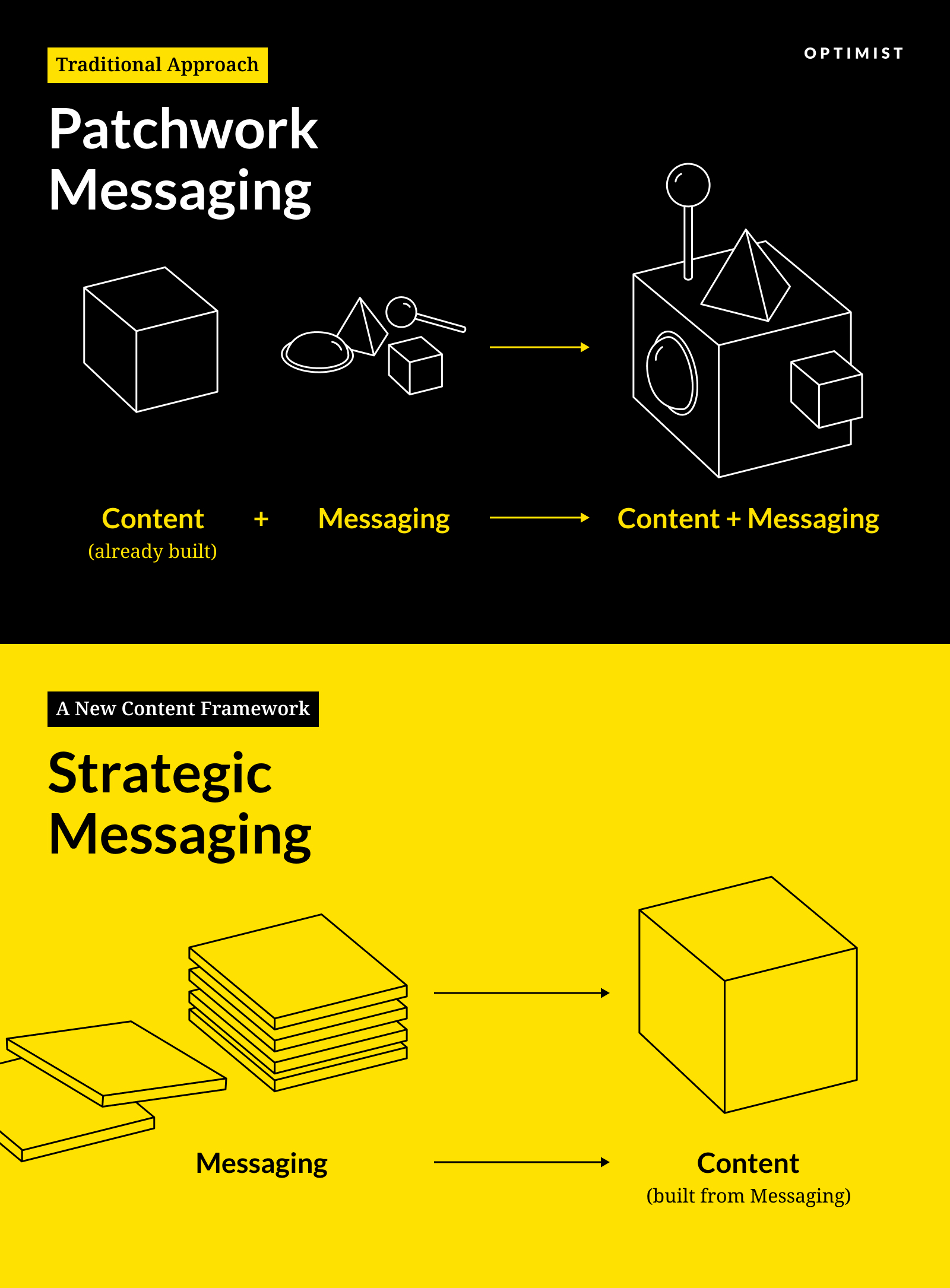
So, start with the narrative. Then plan the content.
Not the other way around.
We’ve boiled our key narratives down to 4 main stories we’re trying to tell in the market:
- Fast-food content: Content teams with no chef. Everyone’s so heads down trying to keep up with content demands that no one’s thinking or planning strategically.
- Content doom loop: The death spiral that happens to content teams when they’re overrun by too much demand and not enough strategy.
- Content creep: Chaos when teams succumb to (or get forced into) the allure of chasing every new channel and content format.
- Fauxsourcing: Half-ass outsourcing that backfires and costs your team more time than it saves.
Our focus for 2025 is identifying all the ways we can tell these stories across our targeted channels and formats.
Creating a New Content Framework
Another major shift in 2025 is building a new framework for content.
We know that the old models are (mostly) busted.
So what comes next?
It’s not the same for every business. But, for us, we’ve built a framework that focuses on the core channels that matter to our audience and skips past the high-volume channels that aren’t a fit.
Essentially, it boils down to this:
- We use our website primarily to incubate ideas as long-form content.
- Then, we repackage that content for native social distribution. Primarily, LinkedIn.
- Finally, we use email not as a traditional distribution channel, but as an accelerator for social reach.
Instead of sending traffic to the content on our website, we’ll send traffic to social.
There, we can drive engagement that unlocks exponential reach and exposure.
Sending traffic from email to the website kills the flywheel.
But optimizing for social engagement pours fuel on the fire.
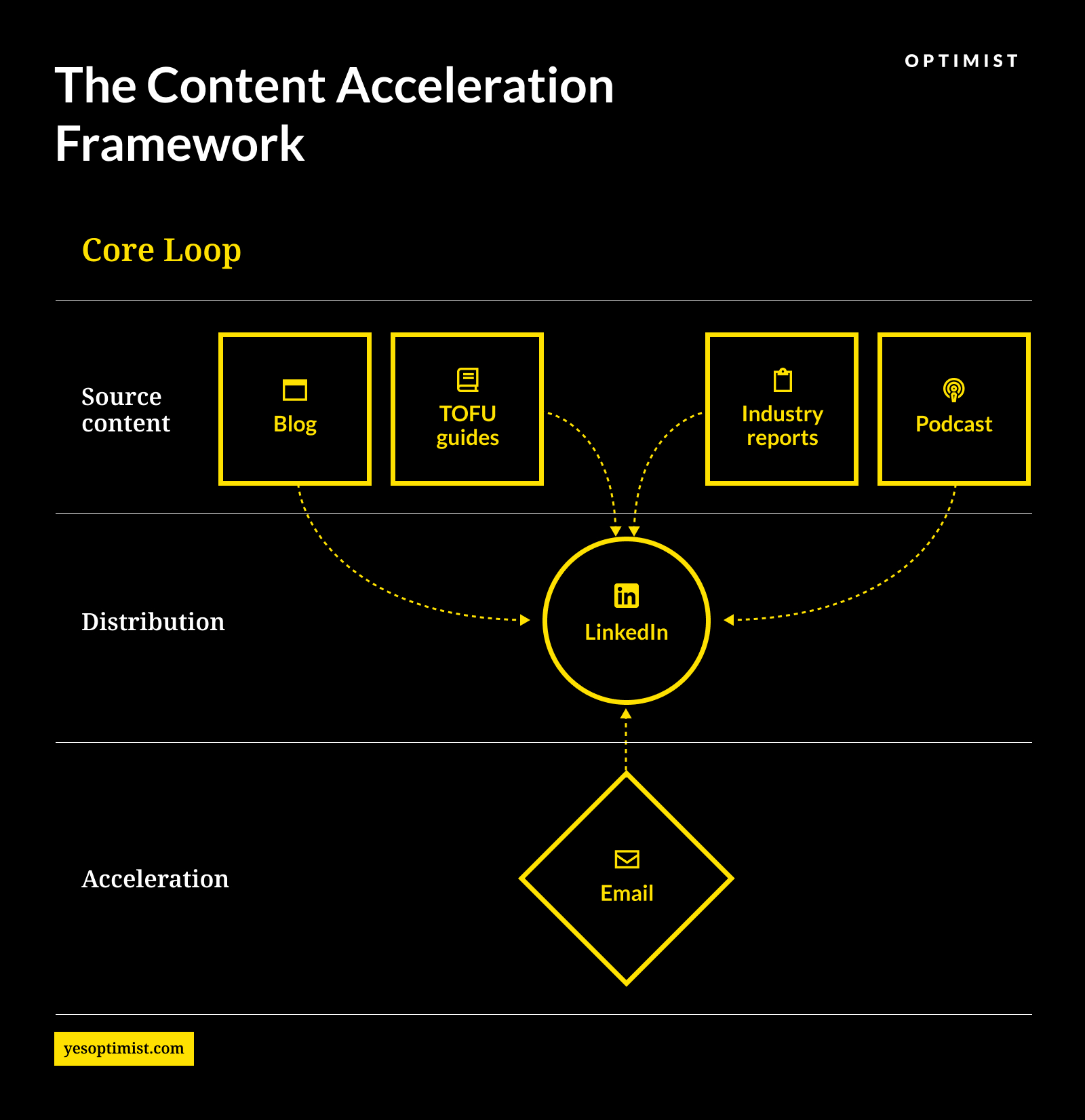
Finally, we have plans to kick off a podcast in the coming months.
This fits into the strategy in two ways.
First, it works as another source of primary content that can feed the social-first machine.
Second, we can use the show as a “soft” capture — growing our audience via listeners and subscribers, strengthening the relationship.
This is a year of big change.
Most of the things that used to work in content aren’t quite working in the same way.
There’s an impulse to act.
To try something.
Try anything.
But I think now, more than ever, is a time for strategy.
It’s a time to create space and bandwidth for clear-headed thinking and thoughtful consideration about what content should look like moving forward.
And it’s an opportunity.
To break some of the old habits.
Find a new path.
Build a future where content works the way we’ve always wanted it to. Where there’s time and space to do something big, creative—risky.
Let’s figure it out together.
Visual direction by Katy Flatt.
Design by Derrick Sun.
Editing by Brinda Gulati.
Content production by Rizky Darmawan.
Tackling Mental Health For Distributed Teams
Published by Paul Perry on April 22, 2020
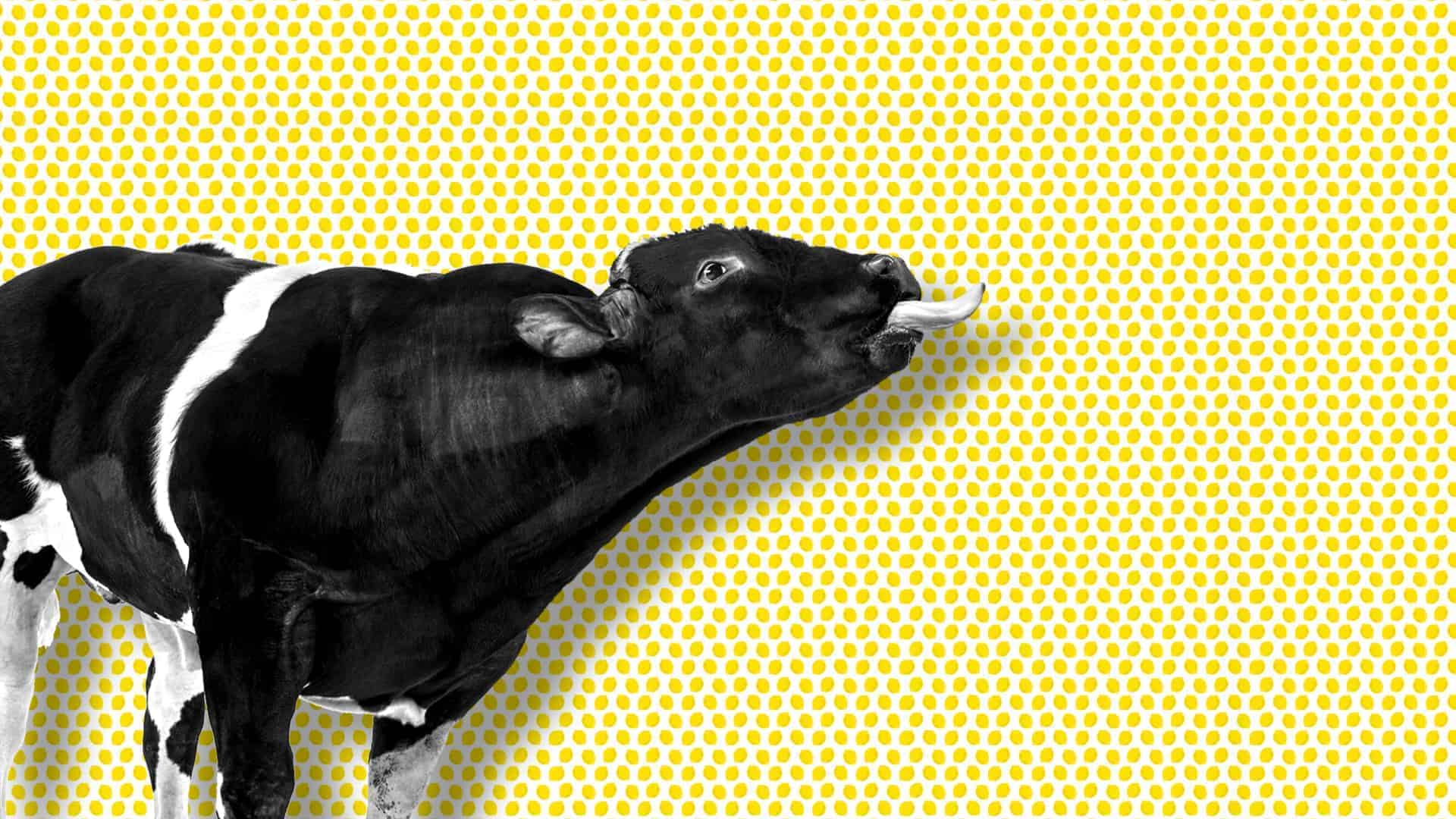
Even the greatest strengths, especially when they get over-used, eventually perform as weaknesses.
One thing to love about remote work is the (relatively) no-drama, no-bullshit work environment. I rarely engage with my colleagues about religion, politics, family squabbles or any other sort of potentially divisive issues.
But what happens when the bullshit really matters?
Remote work keeps you focused on the latter, the work. And that’s part of what’s great about it.
I knew we had taken that idea a bit too far this past summer in London.
Prateek (our lead content strategist) and Tyler (our founder) had both flown 10 hours—Prateek from Mumbai and Tyler from Des Moines—for a week-long strategy session among the three of us. We were setting content strategy and editorial calendars for something like 16 clients. It was our very first time spreading the work beyond just Tyler and doing it together in-person.
Some weeks prior, Tyler and I had a tough conversation in which he conveyed his frustrations to me.
I was missing internal deadlines. The quality of my work was flagging. At least one client had noticed. A change was needed.
Even as we pushed through client calendar after client calendar, things were still tense between us and I knew another conversation was needed.
On one level (the work level), the rationale was simple: I was spread quite thinly across nearly 10 different clients in my capacity as a writer. I was juggling a new and emerging role leading operations and the boundaries of the role weren’t quite set. I didn’t feel set up for success.
At least, that’s what was happening on the surface.
How to Survive a Cruel, Cruel Summer
Underneath the digital veneer was a much more complex picture.
My elderly father was moving into a retirement community and I was struggling to support him by basically engineering that move from 3,539 miles away. It was too expensive to fly home during the middle of the high season in the summer.
There was even a memorable moment when I was literally on the phone with the movers whilst attending a weekend music festival with friends. After his first month in the new place (which is lovely by the way), he fell and broke his leg.
I flew home to help out a few times over the summer, but the travel wore me down.
To make matters worse, my mother called me with some really heart-wrenching news. She was now essentially homeless and living out of her car. For the average person, this would be a shocking development, but for me, it’s par for the course because she has struggled with drug addiction her whole life.
If you want to take a stab at feeling utterly helpless, try getting a call from a parent who can’t even house themselves.
I remember weeping openly in my uber ride back to the airport upon hearing this terrible news. The driver pretended not to see me and made nothing of it. I was grateful for this momentary and kind mercy.
I was spent just trying to get my Dad settled and now this.
When I got back to London the next day—my birthday no less—I tried to keep a stiff upper lip when the woman I was dating met me at Heathrow. Despite my best efforts, she could feel that something had shifted.
I could barely manage what was going on with my family back home. I didn’t have it in me to be emotionally present for our relationship. And I was likely leaving the UK for Mexico in a month or so anyway. I had stayed months longer, in part, because of our budding romance.
The great irony of vulnerability is that it pulls people toward you, not away from you.
The end was nigh, in terms of time and sentiment. We both felt it and it was awful.
So let’s tally all of that up.
An aging father with a broken leg just after a big move—check.
A mother without stable housing—check.
And one crumbling romantic relationship—check.
A true trifecta of personal turmoil.
Unfortunately, none of that can be neatly packaged into my weekly standup update in Slack.
At a “normal” workplace, you run into people at the watercooler and ask them how their weekend was. Maybe you head out for happy hour and wallow together over beers. (Sure, we’ve got a virtual happy hour on Fridays, but it’s just not the same.)
No one at work knew what was going on in my personal life and our work culture was/is such that it didn’t matter. But it did. A lot. Even as I write this, I know that some of our team will read this and learn about it for the first time and even that makes me nervous, though it shouldn’t.
After a few days of being cordial in London, I worked up the nerve to talk to Tyler about it all. It’s not easy talking to anyone, even your therapist (which I definitely was at the time), let alone your founder/boss.
I had to get past those feelings of being a victim to all of these circumstances largely beyond my control. I had to let go of the notion that these things somehow made me appear weak when in reality, quite the opposite was true. I worried too much about how different this would make me seem in comparison to my colleagues who all seemed to be performing well.
On the third morning of the week, Prateek was out at a meeting and Tyler and I had time to ourselves at the Airbnb where we were working. I told him everything that was resting on my heart and he took it in. His first reaction seemed to be shock that all that was happening and he didn’t know about it. We work so closely together. True to form, he focused on what could be done to help, if anything. There wasn’t much, other than hearing me out, and that much had been accomplished.
It was a kind and generous response. I expected no less and I’m not sure why I was so reluctant, in retrospect.
The great irony of vulnerability is that it pulls people toward you, not away from you.
They see their own flaws and frailties in whatever you’ve got going on.
In some ways, they’ve been where you are at that moment. Hell, they might be going through something similar right now and are just oddly grateful to know that someone else at work is going through something as well.
The thing that struck me the most about the whole episode was the space-making that occurred. In a remote, digital environment, moments like that are a bit harder to achieve.
But they’re not impossible. And goddamnit are they necessary.
Building a Better Workplace Culture Through Small Wins
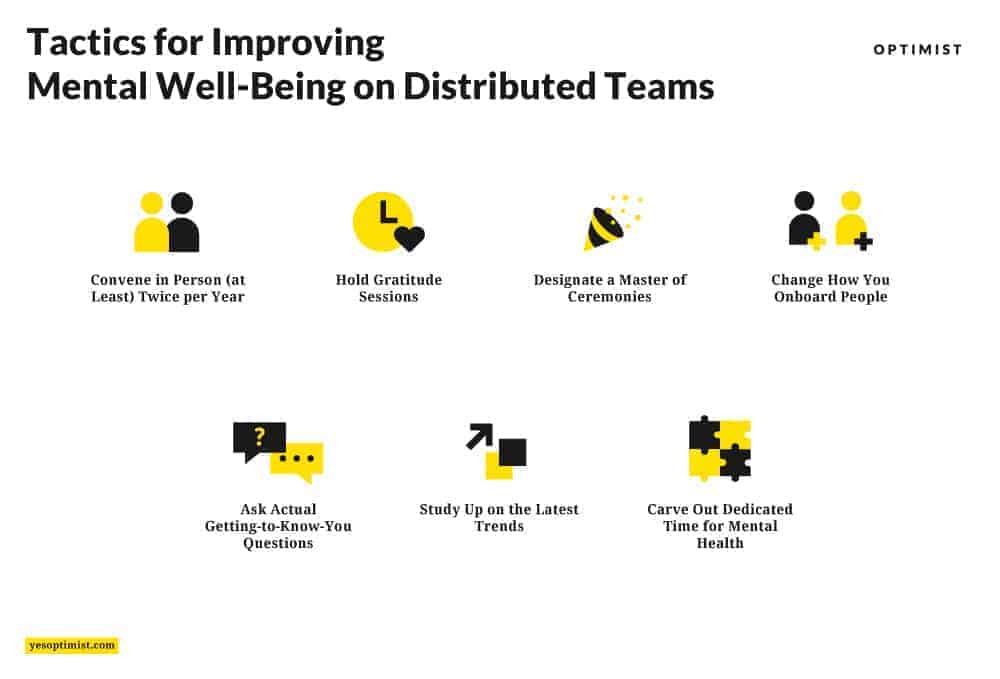
While I’d love to now tell a grand story about workplace transformation starting at that poignant inflection point, I’d be lying.
I’m not going to lie to you. Changing any workplace culture is a slow burn.
But I think what that moment gave us was greater consciousness, and again, space to begin thinking about how and why this stuff we call mental well-being in the workplace might matter. How it might look and feel and perform differently in our unique context.
That’s the other side of innovation, innit? (I’m turning British sometimes, I swear)
And the good news is that things seem to be trending in the right direction.
We’ve been taking biannual surveys of the team, trying to capture their sentiments toward the worklife that we’re building together. The results look generally promising.
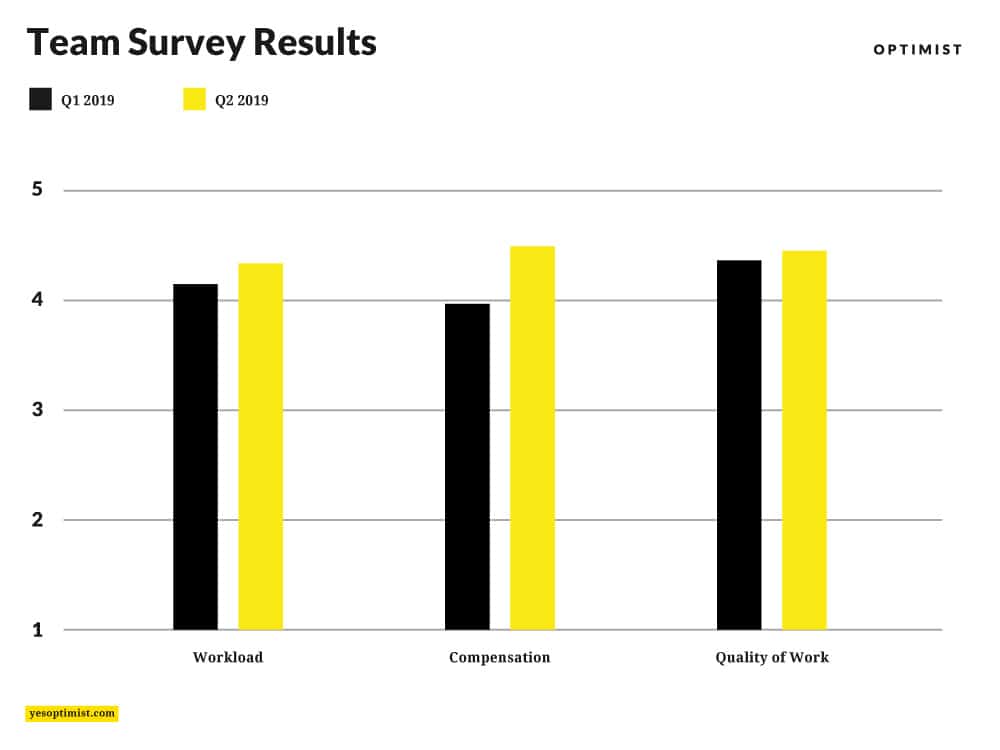
The team seems to be feeling better, overall, about their workload, compensation, quality of work that’s being done.
But, like everything, it’s a work in progress.
When you’re dreaming up a next-generation collective of freelancers who are still freelancers but perform like an agency, there will always be corners you can’t see around and bumps along the road. This was a big one for us.
While this wasn’t a part of some big strategic plan to transform our workplace, we did make some interesting tactical changes that have proven effective.
Convene in person (at least) twice per year
There’s just no substitute for face time.
Now that our revenue allows for it, we’ve committed to bringing the team together (on a voluntary basis) at least twice per year. One retreat is designated as a “perk” trip, usually to an international location (like our last one in Mexico City) with fun amenities like the eco-retreat where we spent a few days together.
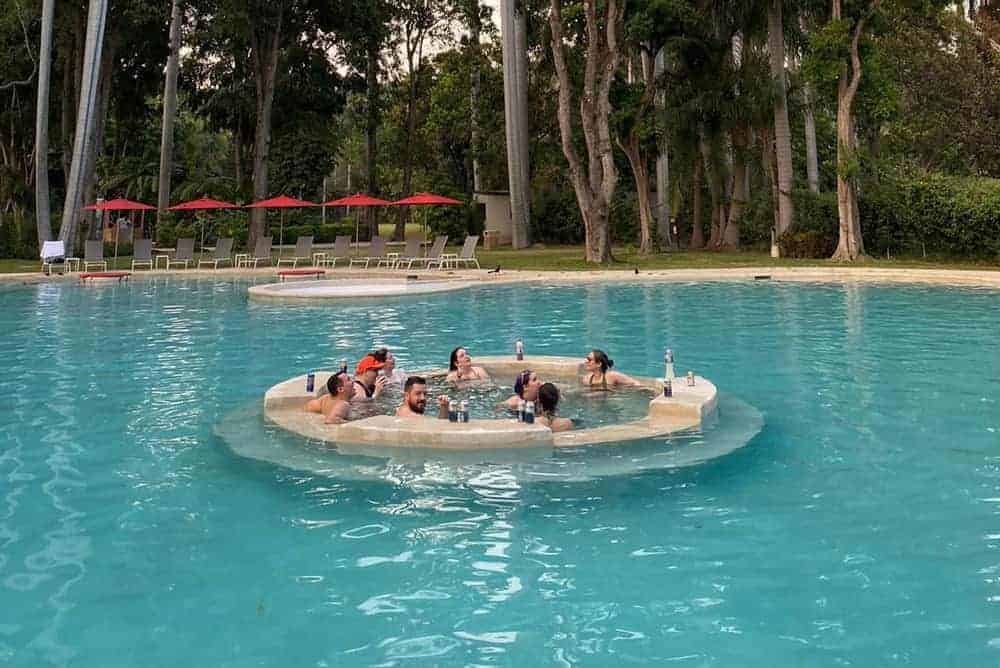
The second retreat is more standard, usually to somewhere easily-accessible in the continental US (since most of our team are based there), but still an enjoyable location like our previous retreat in Nashville.
Wherever we go, people generally come away fired up about the mission of our agency and more empathic and collaborative in their work.
Hold gratitude sessions
At our last retreat, we got all kumbaya with it.
We went to a local park at sunset, sat in a circle, and each wrote one thing that we were grateful for or admired about every other person in the circle. We went around to each person and 2-3 people would share their gratitudes out loud with that person and the group.
Every person went home from that retreat with a pocketful of notes about how wonderful they are.
Sure, it felt corny. It also worked.
Designate a master of ceremonies
I’m not sure how she keeps it all together, but Katy has figured it out.
Virtually every week, there’s a new taco-storm (we give virtual tacos which can be redeemed for gift certificates to celebrate people) for another team member. Usually, it’s a birthday, their “Opti-versary” (their anniversary having joined our funny crew), or they rocked it on some piece of content and got some great client feedback.
Katy on our promotions team keeps track of all of this and makes sure everyone feels celebrated throughout the year. It’s pretty remarkable to watch and takes so little effort on the rest of our parts to quickly celebrate our colleagues from afar then get back to work.
I remember my first few months at Optimist when my birthday passed and no one on the team knew about it. I felt a little tinge of sadness that I wasn’t close enough with the people I worked with (but hadn’t met yet) and that they didn’t know about my special day. And I’m not even big on birthdays!
But that’s the bullshit that matters.
Change how you onboard people
This is a constant moving target.
We’re always finding out that some new freelancers doesn’t have access to this or that important document or weren’t made aware of some ongoing practice.
When people feel lost at work, it just sucks.
Now we’re building a wiki to organize our knowledge management and doing more necessary hand-holding with onboarding calls. We know that people feel more secure and cared for when they’ve got the information and tools (and partnership) they need to succeed from the outset.
So we’re giving it to them.
Ask actual getting-to-know-you questions
Our standups are another ongoing point of evolution.
They’ve gone from actual Google hangout calls, to Slack updates, to Asana updates, back to Slack and Asana updates.
Now we seem to have found the right mix. We ask folks to update their projects in Asana and coordinate with their team members on realistic timelines for work completion. And we also add in a fun getting-to-know-you question after they’ve dispensed with the work stuff.
This is important because all-business standups are off-putting. And it’s nice to ask thought-provoking questions to get your brain moving on Monday mornings. People find out what they have in common with each other and learn new things about their teammates they might not have otherwise discovered.
Don’t sleep on the power of standups for bringing people together over more than just the work.
Study up on the latest trends
Most of our team are voracious consumers of content.
We even have a #content channel in Slack where we share the stuff we’ve enjoyed on the interwebs.
As a bit of an experiment, I started posting more material about mental health and it opened the conversation up. We looked at the State of Remote Work report by Buffer where they call out some alarming trends.
Spoiler alert: People who work remotely have a hard time unplugging from work.
They’re also lonely and sometimes struggle to communicate and collaborate with their peers. Even with all of this connectivity and apps and devices to make us healthier, it turns out we’re still quite overworked and isolated.
Reading up about what was going on in the broader industry helped us benchmark how we were doing as a company. Sometimes you’ve got to zoom out in order to zoom back in on the challenge and get the right view of it.
Carve out dedicated time for mental health
Just make the time. Schedule it. Send the invite.
Show up. Turn your damn video on.
We took a cue from our friends over at Leapers (h/t for all the fabulous work they’re doing in this area) and booked a session completely dedicated to mental health. Just a few team members showed up, which was fine.
We talked a bit about our experiences in general terms and then used the time to just work together with our cameras on. As weird as it sounds, it was gratifying. Just hearing those voices and seeing those faces on the other end of the line made a small but measurable difference in our days.
The next step is probably integrating such conversations into normal practice and not making such a standalone “thing” but, we’ll get there. It’s a good start for now.
Why we’re optimistic about workplace well-being in 2020
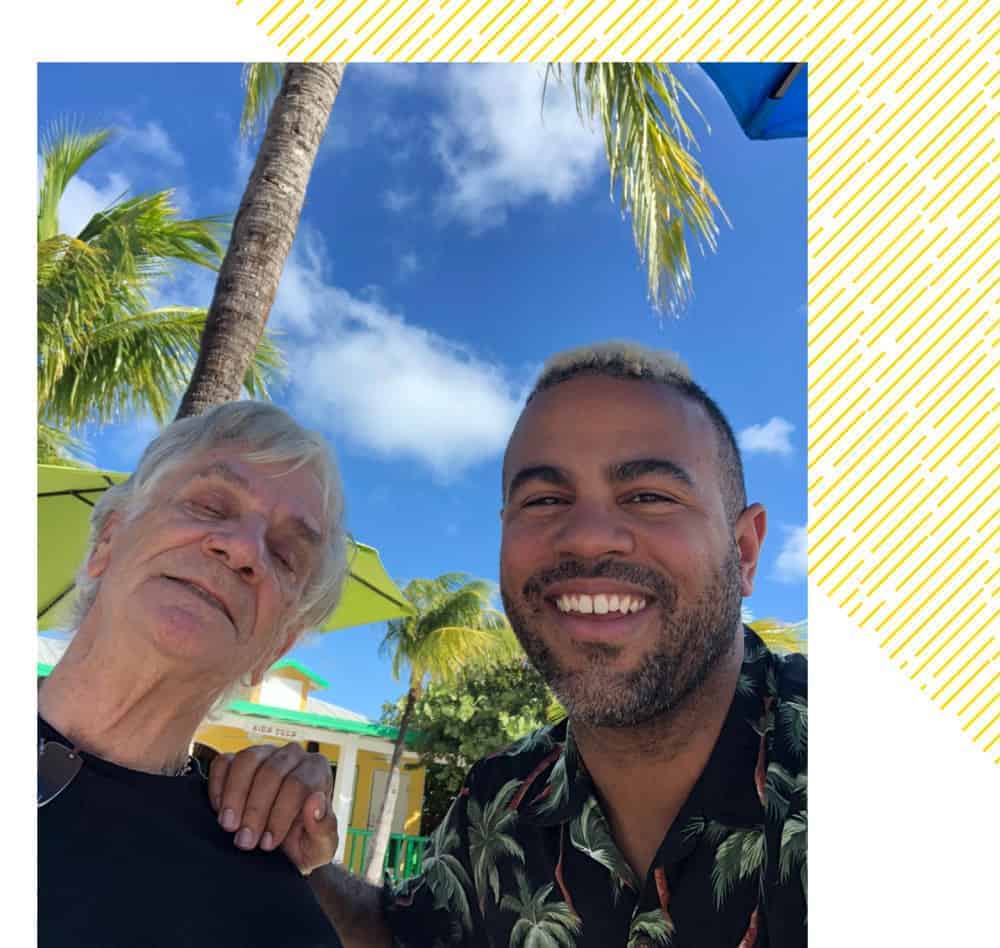
Things have a funny way of coming full circle.
Dad’s leg healed up well, he loves his new apartment (more than he’ll admit to me but he told my aunt as much and then she told me), and we even got to go on a cruise to the Bahamas for Christmas.
Mom finally has a new apartment. And about that relationship…well let’s just say we’re on good terms and still support each other.
After the crucible that was this past year, I’m grateful for all of the personal development and that I work in a place where I can immediately, flexibly, and creatively apply some of those lessons learned to make things a bit better for others.
That’s a lot more agency than most people have in their workplaces and I’m thankful for it.
I recognize that this moment of our collective reckoning with mental health isn’t unique to just Optimist. There are broader trends at play here.
But what last year taught me was the importance of making that space for another. Space to not always show up at 100%, to not always “crush it”, or be a friggin’ “rock star” or insert any other tech bro euphemism that strips people of any sort of natural human frailty.
Sometimes it’s space to just listen. Other times it’s space to say thank you and “I love this one thing about you.” Whatever space you’re making, don’t feel bad about it being a departure from our very task-oriented, remote work culture.
The greatest irony is that without that room for the so-called bullshit, the work wouldn’t get done at all.
How Our Team Built a $1.5MM Agency in 3 Years with No Managers
Published by Tyler Hakes on February 02, 2020.
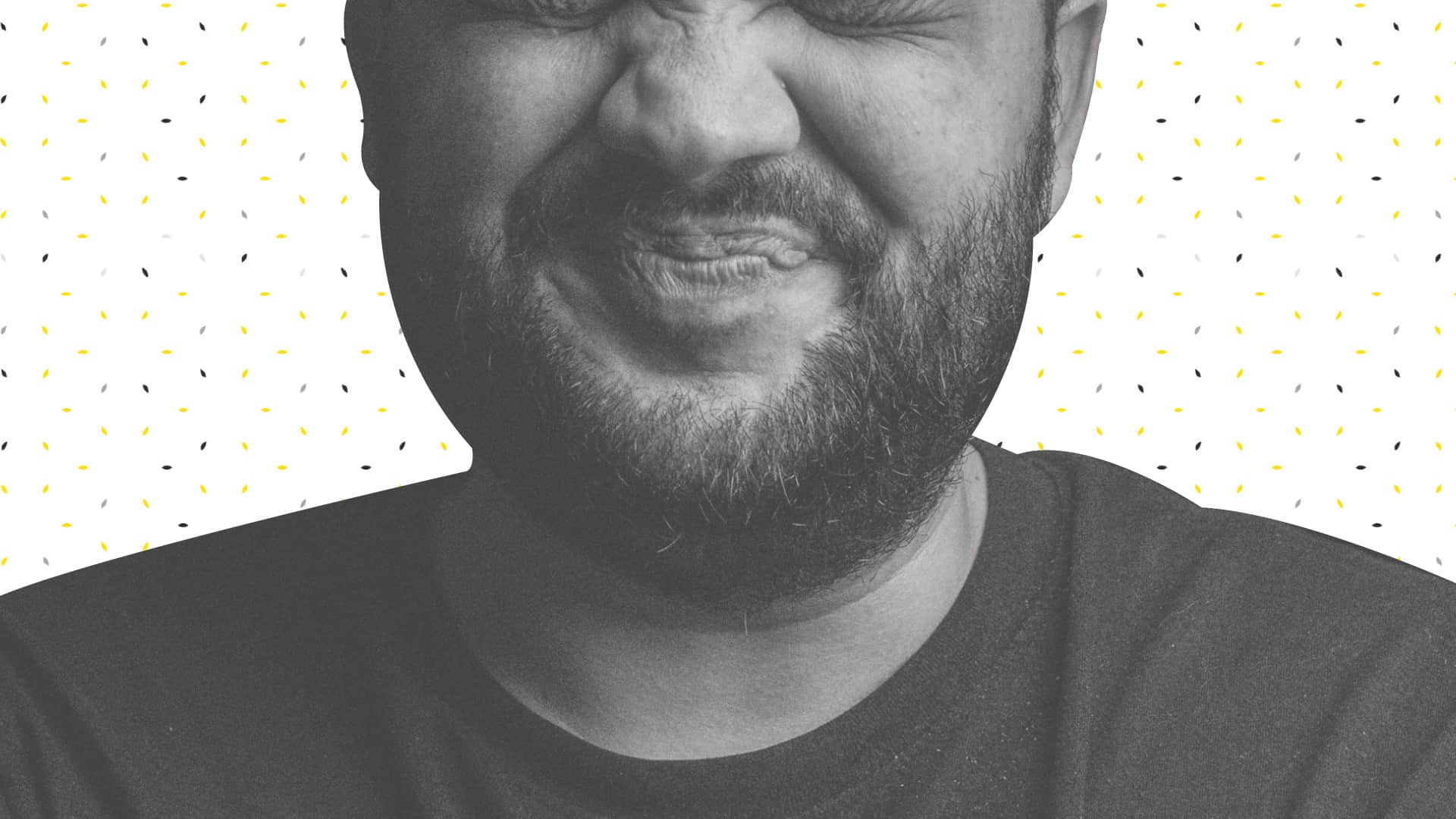
Over the last three years, Optimist has grown tremendously.
We started as an outgrowth of my personal freelancing work. Within a year of launching, we reached a $500,000 annualized run rate. By the end of year 2, we had doubled in size–building a seven-figure agency and reaching our goal of $1 million run rate about 18 months after we officially launched.
Since then, the growth hasn’t stopped.
We achieved our growth goal for 2019 an entire quarter early, shooting past the $1.5MM ARR mark in September.
But the weird thing is how little our organization has changed from the original vision.
While the systems and processes that we have put in place in the early days have had to evolve to accommodate more work and a bigger team, the core values and structure of Optimist have remained unchanged.
In particular, we have remained entirely flat.
We have no managers.
No project managers, account managers, supervisors, or any of the other layers that an agency of our size usually needs to remain successful. Instead, we have a team of specialized creatives that collaborate to get work done without oversight. We have transparent and collaborative communication with clients. And we have a shared vision and strategy for the agency and for each client that we work with.
Most important, we haven’t succeeded through sheer force of will either. No one on the team is killing themselves to pick up the slack for lack of management.
We haven’t succeeded despite having no managers, but because of it.
The flat structure means that we have to pull everyone in. Even though everyone is a freelancer, they have a baked-in incentive to understand the client’s needs and deliver on them like they’re their own clients–and they are!
We’ve developed a work model that allows our team to work a reasonable and healthy amount, earn a comfortable income, and have all of the freedom and flexibility that they want in work and in life.
In other words, we’re exact opposite of most agencies.
So, WTF did we do that’s so different?
I think that the most important element of Optimist’s success can be boiled down to just a single word: Ownership.
Our entire model, from the outset, has been built around maximizing ownership for the individuals on our team and building the company in a way that could remain both flat and scalable. These two ideals may seem to be at odds, but our approach seems to have found the balance.
Today, I’m going to unpack this idea of ownership and why it’s so central to our operation.
Agency Ownership: A Collective Approach
Ownership is a two-sided term.
On the one hand, ownership means to take responsibility for something–to be accountable.
But ownership isn’t a burden. The other side of the ownership equation is the possession of something that has value. Hopefully this thing that you own and are responsible for is also valuable and you will possess its value while being responsible for its existence.
This is how ownership works.
And this is the foundation of the new business model we’re building at Optimist.
Optimist is not a traditional agency.
If we were, we’d hire 10 full-time people instead of 22 freelancers, pay them each $50k/year, and the owners would pocket $1 million.
But, none of those employees would have the same professional or financial buy-in to our agency’s success as the collective owners that make up our team. They wouldn’t be deep experts. They’d need management, oversight, coaching, and mentorship. The model wouldn’t be the same and we wouldn’t be able to create the same value for our clients.
Optimist is not a traditional freelancing outfit, either.
If we were, we wouldn’t pay rates near the top of the market. We wouldn’t offer a profit share to contractors. We wouldn’t have team-wide retreats, invest in helping freelancers learn and grow, or any of the other “stuff” that doesn’t come with normal freelancing work.
And, if we didn’t do those things, we couldn’t expect that our team of freelance creatives act as strategists in everything they do, understanding the “why” behind the work that they do and the way they do it.
But, we break all of these rules that define both an agency and a freelance operation.
So what does that make Optimist?
It makes us an experiment.
Our entire business is built to test a simple idea: Can we build a new agency structure–a new economic model for businesses–that creates the right set of circumstances and incentives to marry the best parts of freelance work with the best parts of an agency?
Optimist is a collective.
We operate in a collective ownership model that gives each individual freelancer an ownership stake in the success of our firm. Likewise, we give each freelancer an extensive amount of ownership over the work that they produce and the relationships that they build with each of our clients.
This is the Yin and Yang that makes our agency’s existence possible.
Our hypothesis is that with the right distribution of ownership–in both senses of the word–Optimist can defeat the mind-numbing parts of agency life while elevating the most rewarding parts of being a freelancer and an entrepreneur.
With the right structure and the right amount of ownership, we can create an environment for freelancers to do career-defining work. And, we can give them the freedom and space to do that work without the tedious and time-consuming parts of freelancing that most creative people hate (meetings, sales calls, pitch decks, etc).
Most importantly, we can give those freelancers ownership over the value that they create, the profit that they generate, and the success of the company that they’re helping to build.
That’s the grand experiment that we’re testing here.
We want to create a world in which the smartest people are able to spend the majority of their time doing the work that they care about, that they’re best at, and that feels most fulfilling.
But, the experiment can only work if both sides of the ownership equation hold true.
- Individual freelancers must commit to the complete ownership of the work that they do
- The company must create an ownership structure that rewards them for that effort
In this model, freelancers work together to build something great. They’re paid for their time, but also for the value that they create as a group. Freelancers have ownership over the company itself–a financial stake both in their own work and in the collective work and output of the entire team.
Ownership is the connective tissue that ties together a group of people around a common goal.
It’s the element that transforms a bunch of freelancers into something greater than the sum of their individual efforts.
Collective Ownership: Aligning Incentives
For most freelancers, there’s a tenuous relationship with the idea of ownership.
Yes, most freelancers technically “own their own business”. But, most freelancers are also the entirety of their business. The financial success of the company is determined only by the effort of the individual.
Most freelancers simply trade their time for dollars. They own the work, but they don’t own the value that they create.
If they want to earn more, they must work more.
But wealth is built through ownership of value, not work.
In the same way that renting doesn’t lead to equity and wealth, freelancing can be just as constricting for individuals looking to build a sustainable lifestyle. It can be impossible for freelancers to break out of this mousewheel and achieve the kind of financial freedom that’s usually associated with owning a business.
What Optimist is attempting to do is reinvent the idea of ownership for freelancers–to give them a way to collectively own the company for which they create value. In other words, transforming multiple individual freelance businesses into a single collective that generates value above and beyond the hours that each individual works.
Then we distribute that value across the team.
This is the basis for our profit share program.
Each member of the Optimist team is eligible for a share of the profits that we generate each month. That share is determined by a combination of three factors:
- Seniority
- Client workload and role
- Operations roles
Most members of our team earn between 2-5% of our net profit each month in addition to their hourly earnings.
And, as our company grows–and profits increase–each member’s income grows as well.
Even when freelancers can’t take on more work, their earnings can continue to climb because they retain ownership over a share of our profits. Each member of our team is building equity in the company itself and each person has a real financial stake in the work that we create and the relationship that we build with our clients.
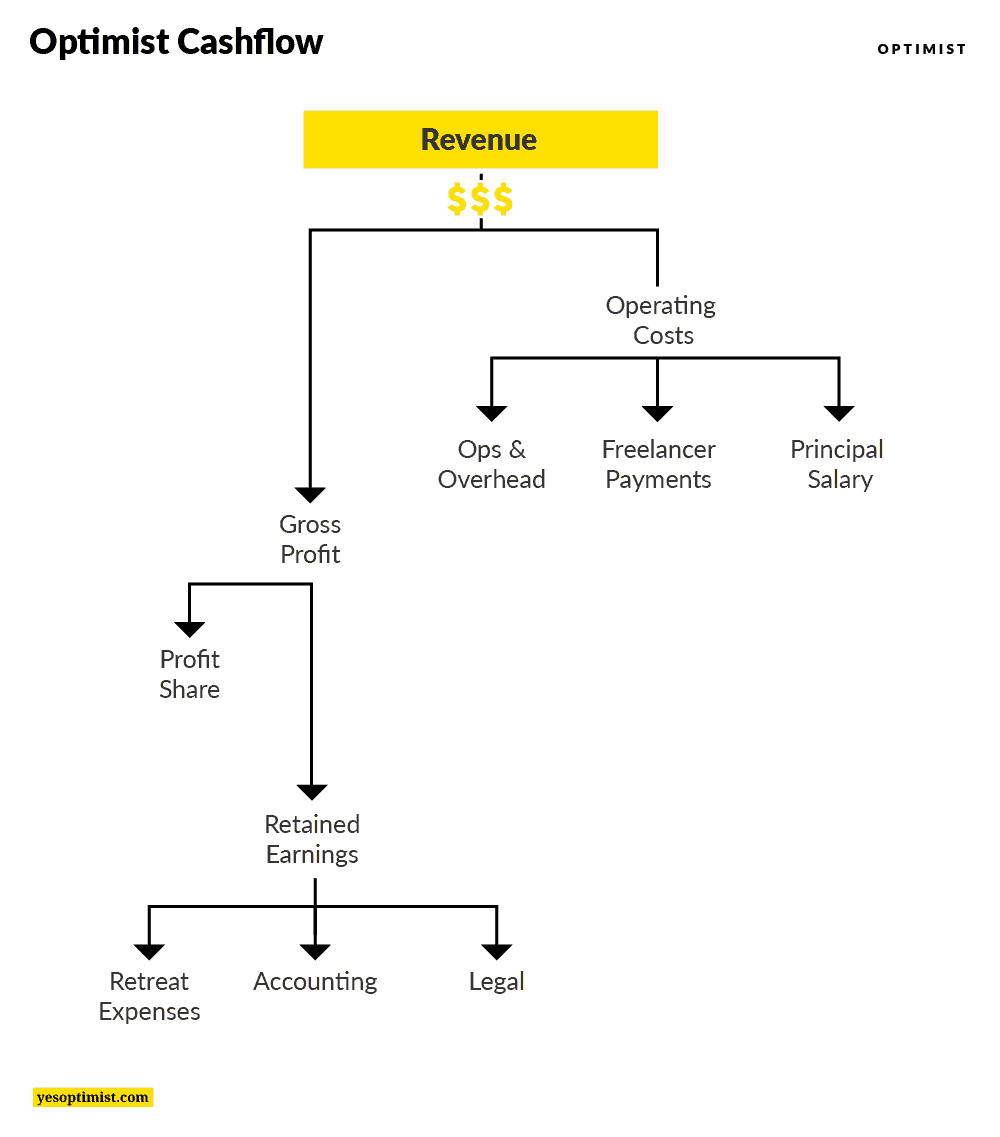
And because we remain flat and lean as an organization, we can do this.
Rather than retaining the value as earnings for the firm, which would pay for things like executive and management salaries, our flat structure means that we have very low overhead costs. And, because our goal is to balance the ownership of work with ownership of the firm, that value creation is distributed to the team each month as a type of dividend.
In most companies, the “labor” of the firm is compensated for their time and the excess value that’s created by the combination of each worker’s efforts is the profit that flows through to owners and managers.
This is the basis for capitalism.
Those who have the means to hire others to do the work are able to reap the benefits and turn their money into more money.
In the Optimist model, we embrace a more equitable division of both labor and profit. No individual was asked to risk capital in order to start the company. And, since there is minimal overhead or management, it only makes sense that the profits from the value would flow to the individuals creating that value rather than the first one to the table.
As long as everyone owns their work, we’re able to distribute the value back to the team.
Ownership of Work: Making Every Team Member Matter
Ownership of value is only possible if our team also practices ownership of work.
Freelancers are generally used to being responsible for the work that they deliver to clients. They are used to owning the “product” that they create.
Optimist is built on that ownership.
At the most fundamental level, every member of our team must take ownership of the work that they create and deliver to our clients.
This can mean many things depending on the context. It means editing, proofreading, and standardizing. But it also means understanding the context of the work and identifying when it needs to be restructured or reimagined to become something more valuable.
It means going the extra mile in every instance. It means making sure that we deliver the best possible work that we can deliver—something that holds water as a resource for readers and an asset for our clients. It means exceeding expectations and taking pride in the craft and the product that we deliver, not just going through the motions in order to check off the task.
This central theme reverberates through our organization.
Ownership of work frees us from the traditional agency model that’s muddled by hierarchy, bureaucracy, and layers of management.
Rather than following strict protocols to standardize our process and our deliverables, we rely on individuals to be experts and owners of the work that they’re creating with other members of the team. It’s because of this structure that ownership must exist in order for us to continue to be successful.
There’s no manager or creative director to own the work.
Everyone owns it–collectively.
Without ownership of work, ownership of value is not possible.
Protecting the Culture of Ownership
Ownership as a concept cannot function on its own.
The reason that we’re able to both expect and provide ownership is because our team is a group of people who are capable of that ownership.
Our operating thesis has always been that anyone who is an experienced, full-time freelancer is used to the balance that comes with this kind of role. We can expect more from a freelancer with a vested interest in our success than an employee who was being paid a set salary.
In other words, our collective model is our competitive advantage, not a detriment.
The fact that freelancers comprise our entire team makes us better, not worse.
Having zero managers results in better work, not a sacrifice in quality.
For this to hold true, the concept of ownership must balance on top of a work environment where people are truly engaged and and encouraged to take ownership.
In Dan Pink’s book, Drive, he explained that the concept motivation could be distilled into three core components:
- Purpose
- Mastery
- Autonomy
Optimist is built, in part, on these concepts. The idea is that in order to everyone on the team to practice and maintain ownership, they must be capable of autonomous work. But, that autonomy doesn’t come on its own. It’s a function of the other components.
Without purpose, there will be no mastery.
If the team doesn’t feel invested in their work, they won’t have motivation to learn and grow. They won’t be driven to master their craft.
Without mastery there can be no autonomy.
If each member of our team isn’t a master of their craft, then we can’t allow them to work autonomously.
And without autonomy, there can be no ownership.
If our team doesn’t work autonomously, then they can’t fully take ownership for the work that they produce. Someone else will have to. And that person will also take ownership over the value that’s created–that value will pay their salary.
What this means is that our competitive advantage–what makes us unique as an agency–stems from these 3 elements, which enable the ownership model that validates the entire business model.
It’s a delicate balance.
If we remove any of these components from the equation, it could be a recipe for disaster. But if we continue to maintain the balance, we have a special recipe that seems to give us superpowers in growth, client retention, and client success.
Optimist 2.0: Deeper Ownership
Since surpassing our original revenue goal ($1MM ARR) and now meeting our stretch goal of $1.5MM ARR even before the close of the year, we’ve been stuck with one key question for Optimist.
What’s next?
Do we continue to grow the firm in the same way that’s gotten us here?
Do we adapt our structure to scale even further?
Do we create something completely different with our combination of talents and cashflow?
I posed this question to the team at our last retreat in Nashville.
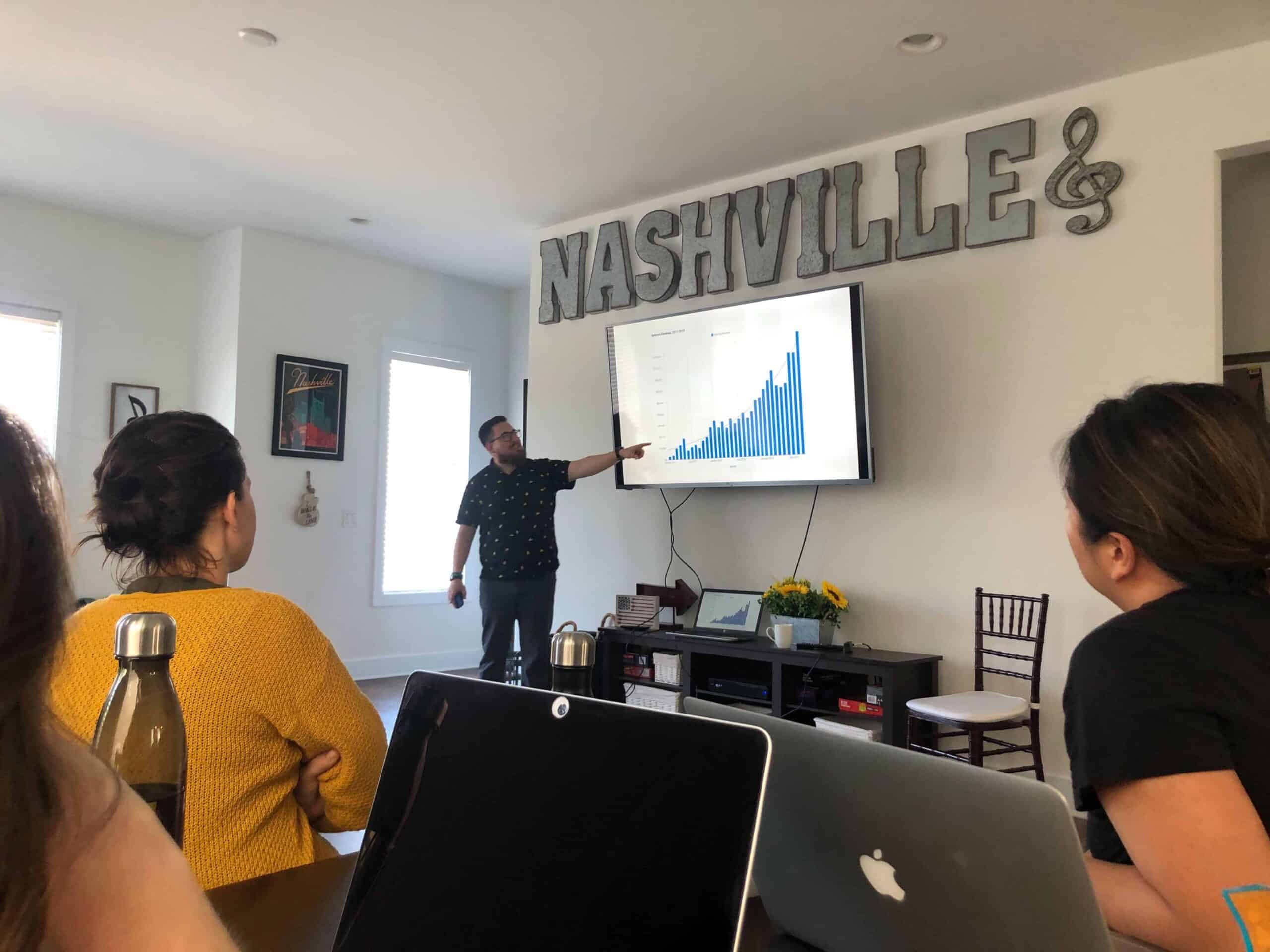
As a collective, we decided on the trajectory that we want to pursue for Optimist.
The results were interesting.
First of all: We’re focused on stabilization. Growing from $0 to $1.5MM in revenue in 36 months has been a tremendous ride. But it’s also exposed some of the weaknesses and threats to our business model.
If our goal is continued growth, what got us here definitely won’t get us there (assuming we set an equally ambitious goal of moving to $5MM to $10MM in the coming years.)
We have a lot of underlying systems and processes that need to be refined, improved, and changed to help us maintain balance at our current size.
So, our first order of business is finding balance.
But, that’s just a temporary phase of business growth. While we discussed the idea of an indefinite period of stabilization, that wasn’t the vision that most people wanted to pursue.
They wanted to turn the corner.
Our team is still hungry for more–growth, change, and experimentation.
One of the missing pieces of this equation is that while the members of our team own the value that they create for us, we have little financial stake (and ownership) over the value that we create for clients.
So, the next phase of Optimist will be focused on a slow and controlled transformation.
We’re pivoting Optimist into an startup incubator of sorts.
We’ll always prioritize the work of our existing clients, but we’ll slowly transition away from taking on new clients and shift toward building, launching, and monetizing our own projects. Our team will use our talents and revenue to build products and services that we can own—fully.
Our vision is to create new revenue streams that generate income for our team, without an endless loop of trading time for work.
But, more importantly, it’s a vision for creating shared wealth for everyone who has worked so hard to build our company to this point.
As we embark on this new vision for Optimist in 2020, we’ll face a huge number of obstacles. There are so many unknowns that it’s hardly even worth giving them a thought at this point. We have an incredible amount to learn and we know almost nothing about the journey that’s ahead of us.
But, there’s one thing I know for sure.
The Optimist team has built something special.
We’re a collective that’s greater than the sum of each individual contributor on our team.
With a team full of strategists who truly give a shit about what we’re building, we can overcome any obstacle and solve any problem–together.
Cheers,
Tyler
The Deal Is in the Details: Reflections On My First Year as a Principal at Optimist
Published by Paul Perry on March 18, 2019

The email came in last St. Patrick’s Day.

You wouldn’t know it by looking at me, but I’m very Irish. Approximately 55% according to Ancestry.com. But I digress.
All of that to say, it was a particularly auspicious day for multiple reasons.
I had put in my time—roughly four years—as a freelance content writer, slugging through my fair share of great and pretty crappy client engagements ($0.05 per word whaaaaat!). I built up my portfolio and had done a pretty poor job of advertising myself (save for a professional site graciously crafted by some developer buddies).
Somehow, Tyler found me in the depths of the Interwebs (read: my woefully under-updated Angel.co profile 🤦🏾♂️). He asked if I’d be interested in writing for Optimist. Honestly, this had been the gig I had wished for my entire freelance career. I thought to myself:
Boy, I’ve come a mighty long way since the days of writing $20 per blog post for obscure sites after blindly responding to Craigslist job postings. 😱
With a solid complement of freelance clients and a steady full-time gig that was super flexible, I decided to shoot for the stars.
I pitched Tyler on bringing over my portfolio of freelance clients and slowly onboarding as his first Co-Principal.
I had the sense he wanted to grow the agency and this was my shot to level up starting with the clients I had cobbled together on my own. I flew to Denver a few weeks later and we spent the weekend grabbing meals together, whiteboarding firm strategy, and even tossed in a few late-night brews and hip-hop out with my Denver buddies one night.
Getting comfortable with each other through that in-person time was critical.
We made a gentleman’s handshake agreement to embark on new terrain together. Neither of us knew exactly where the rest of the year would take us.
Tyler had built Optimist from scratch and was taking a huge chance on me. There was no playbook for bringing on a co-principal in a context like this. In turn, I committed to transitioning out of my full-time consulting gig over the next few months.
Playing double duty, it was a slog. In retrospect, this was probably not the best way to onboard a co-principal but it was a necessary evil. I couldn’t give up my full-time income just yet as we felt our way through the right break even point for my full transition.
Personally, I didn’t realize how much I’d have to dig into my personal and professional background to step up and get the job done.
In this post, I’ll outline my high-level learnings from my first year at Optimist. In an upcoming post, I’ll share some of the more tactical moves we’ve made and why.
Relationships are the fuel for our work
My first job out of college was as an 8th grade English and Social Studies teacher in Southwest Philadelphia.
Talk about a baptism by fire.
I was awash in an insane level of details. One hundred and fifty kids and their varying reading levels, family situations, parents’ phone numbers, scholastic history, etc.
It feels awful when you threaten to call a child’s mother—on account of their behavior—only to realize the moment after the words escape your mouth that the child’s mother passed away years ago. Yikes. Detail missed.

As most teachers do, I eventually figured out how to master bizarre quantities of details, develop eyes in the back of my head, and cultivate a strong teacher face (of disdain) that could stop kids dead in their tracks. By summoning the right detail in the appropriate moment, I could persuade, cajole, motivate, and generally infuse each human relationship with the adequate amount of emotional energy to find compromise and progress.
It was my first lesson in sales.
Turns out I’m pretty good at talking with people and distilling down complex concepts into everyday language. I effectively grew up as an only child (though I do have older siblings—a story for another day) so I learned at an early age how to negotiate my way through partnerships with people outside my own family. That’s how only children get by in this world!
Playing to this strength has made me a more effective partner to Tyler and co-principal for the agency.
During those harrowing first two years of my professional career, I would often harken back to my Leadership professor—Dr. Stiles—from my college days and her infamous maxim:
Leadership is relationship.
A-friggin-men.
It’s the most fundamental and cyclical lesson about work. What is work, anyway? It’s just interacting with other humans in a (hopefully) mutually beneficial way. Master those details, foster those relationships, and work will be a pleasure.
I like to think that’s what we’ve built here at Optimist. A (relatively) drama-free workplace where people do what they love in joyful and beneficial relationships with one another. Isn’t that the dream?
One learning I’ve had to take to heart:
The deal you make with a client is sacred. It really freakin’ means something.
Think about it: They are putting their business, their livelihood, their goddamn ability to feed their families—partially in your hands. They give you their hard-earned (or VC-raised) money and they say:
“Help me provide for my loved ones by executing on something I can’t really do for myself.”
That’s huge.

I’ve had to internalize that each client engagement requires personalized and attentive nurturing. Hiba is different from Ben who is unlike Matt who is distinct from Romain who is nothing like Morten.
Not too dissimilar from how I learned to give individual attention to my students in the classroom and schoolwide, I need to bring our team’s gifts to bear for each client in unique ways.
Sometimes this is as simple as scrolling through my starred channels in Slack each morning and thinking to myself: “How can I make this engagement with Client X awesome today? What can I toss their way to make them happy with this partnership, to enrich their work?”
Other times it’s just throwing my noise-canceling headphones on and hunkering down into a great piece of content—the one that’s been sitting open in my tabs all week—and refining the research a bit more, improving the design directions, and making the content even more tactical for busy readers.
When I ground myself in showing up for our clients as people, it makes the world of difference.
The Once and Future Principal
I later went on to become an assistant principal at another school and the importance of details became even more critical.

I had been put in charge of standardized testing for the entire school (both the middle school and high school, around 1000 students and 100 staff). My task was an operational one—set up all rooms for testing, coordinate the flow of students and staff from room to room, nail down the precise schedule.
Man, did I botch that job.
On the very first day of state-sanctioned testing, I somehow mixed up the rooms and duplicated certain schedules. Hundreds (literally, hundreds) of students were stranded in the hallways with no place to go. Teachers were pissed. Students were confused. We risked being in violation of state laws around testing.
It was a bit of a blur, but I somehow triaged the situation in the moment and fixed things for the next few days of testing. I sent a massive apology email to the staff, dripping with self-loathing. I hid behind my inexperience as a first-year administrator and my overwhelm at maintaining a full-time job alongside a full-time academic schedule.
Another stinging lesson on the critical importance of getting the details right as a leader when people (over a thousand in this case) are counting on you.
I share these stories because becoming a principal at Optimist has reconfirmed these early career lessons for me.
I need to slow down, button up the details, and take greater care. If I fail at this, we don’t get the client the high-quality content we’ve promised them. Our professional integrity is on the line.
The biggest shift for me has been translating these lessons from the nonprofit/social sector to the business sector. Before, mistakes like the ones I mentioned had far less of an impact on any sort of fiscal bottom line. Maybe some passive-aggressive emails and some social anxiety, but that was generally the extent of it.
Now, it’s all too real. Gaps in performance mean we as a firm and our clients miss our collective goals.
It’s dollars and cents, now.
I undervalued that significant shift in perspective and through trial and error, have come to realize its gravity. Now, I try to immerse myself in the data on a regular basis to make sure that not only are we hitting our internal marks, but we’re uplifting our clients to hit their goals as well.
We decided to take it slow. I started writing for one client and then managing that same client (somewhat) on my own. It was a bumpy ride at first as I learned the ins and outs of being an account manager in an agency context. I had “managed” clients before, but this was different.
I quickly and somewhat painfully learned a few key lessons:
- Overcommunicate with clients. (Avoid those dreaded “Where are we on this?” emails at all costs.)
- Do the heavily detailed research/strategy work (both broadly and within each piece of content)–that’s why clients hire us.
- Own your mistakes, then fix them, quickly.
- Show that you’re thinking ahead and looking around corners for and with clients.
- Constantly make an effort to delight them with the stuff you produce.
Each one of those lessons came from some kind of fuck up. Sometimes multiple, repeated blunders. That was hardest part, seeming to repeat the same mistakes and feeling like I wasn’t learning or growing at times. As with most things, it got better.
My existing clients sort of fell by the wayside on their own and/or weren’t a good fit for the Optimist model of end-to-end content strategy + execution. While I was sad to see them go, I was also happy to be doing much more strategic and frankly intellectually stimulating work.
I was honestly a bit embarrassed that I couldn’t manage to bring over a book of work as I’d initially promised. I didn’t want Tyler to think that I couldn’t deliver. So I committed myself to lighting a fire under our Business Development efforts.
By the end of 2018, I had left my now-previous full-time role, reached 6ish clients in my individual portfolio at Optimist, and we hit our $1MM revenue goal. Getting there was no small feat, though.
Show Up for People

There were plenty of come-to-Jesus conversations.
Sometimes it was my not knowing what I didn’t know. A true skills gap.
Other times it was just sheer inexperience. Not grasping the intricacies of client management.
And still in other moments I was playing too fast and loose with timelines and details. After all, as account manager and principal, the buck always stops with you. If you don’t master the details and insist on those deadlines, no one else will.
I had gotten used to a carefree style of freelancing in which I moved the work around at my leisure for a very small number of clients. There were no shared Asana boards. Content calendars could be flexed. Any blowback affected only me. I didn’t have a team and a business partner relying on me. Now things had changed.
Tyler struck a good balance of being insistent, protecting the Optimist brand, insisting on quality work, while also trying to educate and bring me along into being a full partner for him in this work.
I’m still not there yet.
As our roles evolve, I’m taking a step back to learn more of the research/strategy side of the agency while Tyler remains heavily involved in that aspect and the ongoing management of all client accounts. I am now pushing into Operations more deeply to ease the burden on that side as much as possible.
It’s not easy to do that kind of relational work remotely, either.
We probably don’t hop on the phone as much as we should—an attempt to value each other’s time I suppose. But when we do check in, we learn from each other and the whole firm is made better.
I want to underscore one very big thing here too.
Building an agency from scratch is no small feat. But trusting someone with your baby is a huge leap of faith. Investing the time and energy to train up that person and backfilling where needed with client engagements as they learn is a tremendous investment of time and energy.

This has been a real-life What Got You Here Won’t Get You There moment. (Great book by the way, go grab it).
Tyler had to level up as a teacher/coach/trainer. He had to learn to let go of some control. He had to let someone else shape and help raise his (now our) baby. I had to learn while doing. Take on greater responsibility for quality and delivery than a typical freelancer. Manage the work of others (again).
At this point, we’re taking stock and creating a more structured plan for what it means to become a partner (on the leadership team) and a principal (managing client accounts) at Optimist. I’m the guinea pig for this little experiment of ours, with the hope that it builds a stronger agency in the long run.
We were and are walking through the unknown together as the work is real-time and high stakes. I don’t know if there’s a way to lower those stakes, slow down, and train in some different manner. And I’m not sure if that other way would even be better.
But I do know that it’s not about just onboarding a new person. It’s about becoming a new team. With every new principal, partner, writer, designer, promotions expert, content strategist, etc.–we evolve into a new agency of sorts with highly dynamic habits for collaboration and production.
That means that processes and procedures need to shift as well. It’s not the sexiest part of the work (I’d much rather be producing dope content for a client), but it sets the foundation for great client work.
Revisiting and shoring up that foundation is critical as your team evolves and your client portfolio grows.
The Joy of Making a Better Internet
We make stuff.
We’re damn good at it.
We’ve convened an incredible team of creatives and digital technicians with a mindset for helping our clients get discovered and grow. We’re growth hackers artists.
We know that growth isn’t a straight line. It’s a trend, developed over time with painstaking effort and optimized precision. This work is part computer science, part prose, with healthy doses of art and operational excellence tossed in there.
I say this to take a step back and contextualize our work in the broadest sense.
The other day, Tyler shared a powerful reflection:

This same idea has crossed my mind in more sentimental moments:
At a roadside cafe overlooking a beautiful bay in Thailand.
Walking through a sun-drenched city park in Mexico City.
Having a beer (outside!) on a balcony at dusk on a summer evening in Berlin.
Those were all actual moments when I was working (or at least thinking through something about work). How #blessed (I hate that meme/phenomenon) are we?
From helpdesk software and restaurant supply apps, to polyamory/open relationships in France and CRM tools—we cover a lot of ground. There’s never a dull moment at Optimist.
We get to spend our days studying cool, fascinating things and educating other people about them. We get to work at our own pace, without overbearing bosses breathing down our necks. We get an escape from the 9-5 grind, untethered from desks and cubicles (nothing wrong with it if you’re into that sort of thing).
We get to make the Internet—arguably the defining town center of our generation—a better, more interesting place.
I try to stay humble about and thankful for that. It’s not about having paternalistic pity on other people for whatever their job circumstances are. This job certainly isn’t for everybody. I know I’m sacrificing my physical health to some extent by staring at a computer screen while seated most of the day. I wish I could integrate more movement into my days. I don’t love feeling shackled to Slack at times.
As with most good fortune, it’s about gratitude. It’s about perspective.
For someone who comes from the education/social sector, it’s a dream to feel like you’re doing some good in this world while also making a solid living. Even better to do it on (mostly) your own terms from where and when you want.
We joke about living the dream, but I think this work comes pretty damn close.
Emerging as Optimist(s) in 2019
Stability is a funny thing.
Just when you think you’re riding high and steady, you get that email or Slack message that upends the apple cart. It keeps you on your toes, but it highlights a fundamental tension:
Growth is unstable.
It’s inherent. If you want to grow, you’d better be ready for some discomfort (the ongoing kind).
My big lesson from this first year at Optimist: cultivate your range.
What do I mean by “range”? I mean being able to immerse yourself in the details like that Google Analytics page with organic traffic results or how precisely to structure that piece on repairing a refrigerator seal while also being able to set broader firm strategy, hire and onboard new team members, and revamp your team’s approach to research for all linkbuilding content.
Toggling between the mucky minutiae and the 10,000-foot view, constantly. That is range.
I know that in my evolving role and given who I am and who I’ve been professionally, I need to lean more in one direction—the details. For myself, my team, and our clients.
More and more, I’m finding that’s where the joy of the work is. And the results.
—Paul
Optimist Year 2: Building a $1 Million Content Marketing Agency
Published by Tyler Hakes on January 10, 2019
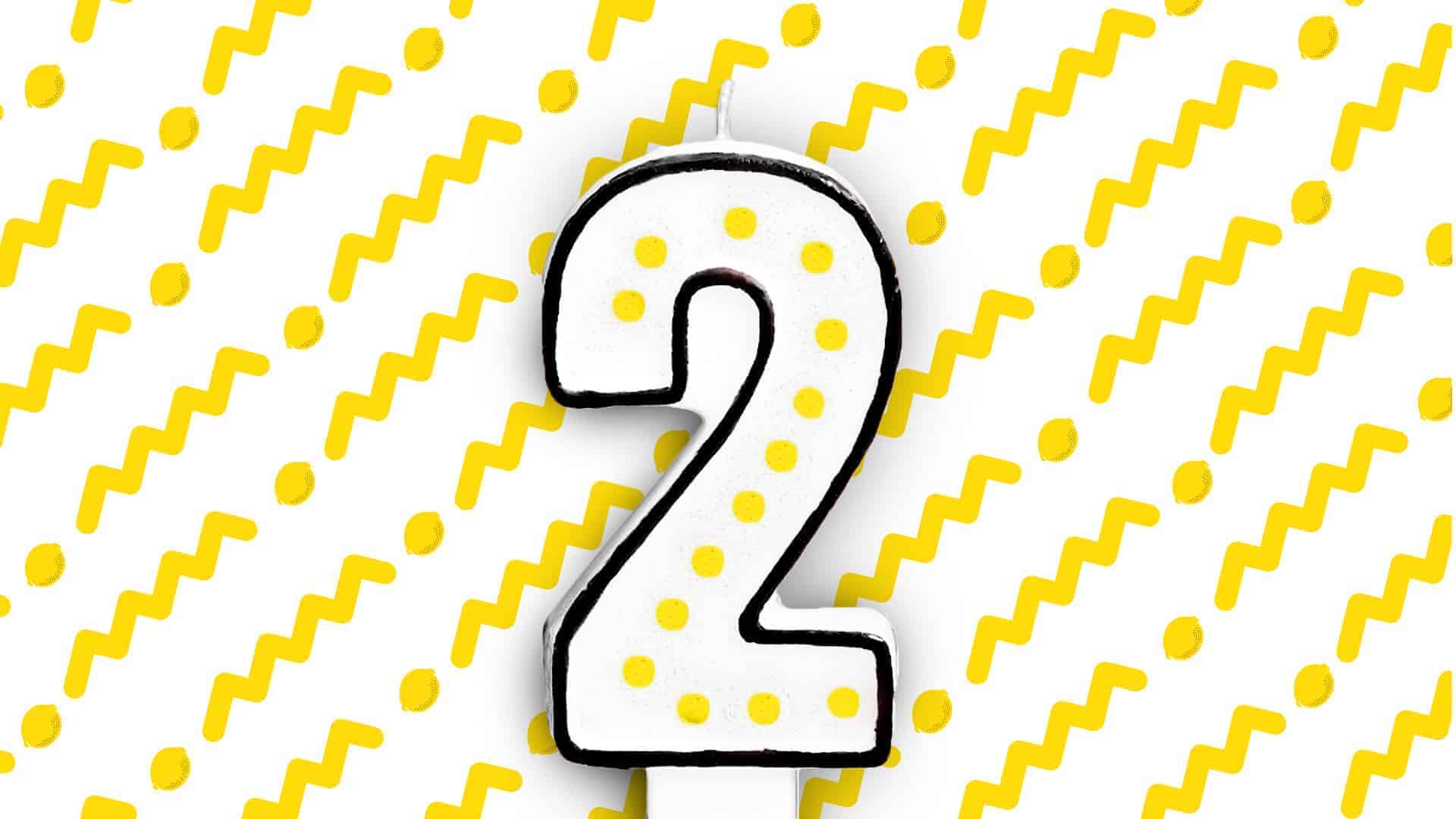
Well, it’s the new year.
That means it’s time to think back and reflect on the last 12 months. It’s time to figure out what I learned, what I got right, and how I screwed up (again).
But first: It’s time to eat crow.
Yes, I failed miserably at keeping our site and our blog updated.
There are a lot of things I could say about that, like how we were so busy with growing the company that I just didn’t have time to keep up with everything. Or I could bring up the whole “cobbler’s children” analogy to imply that our paid work was taking up all of my time and energy.
But here’s the truth.
Growing a company is stressful.
The last year has been a truly crazy ride. The agency has seen a tremendous amount of growth and change.
But, I’ve also undergone a lot of growth and change as a person, an entrepreneur, and a leader.
In this post, I want to share some of my business learnings from 2018. But I also want to share some of my personal growth.
I feel like a lot of the stuff you read online about growing a business is rose-tinted and, frankly, bullshit. Everyone wants to put a positive spin on their efforts and make it seem like they’re building the next rocket ship. But I think the reality is usually a lot more turbulent. Not only is building a company rarely a perfect straight line, but the ups and downs that you experience along the way also have a personal toll.
Anyone who’s gone through the process knows how it goes. You have high days when you’re on top of the world. And you have low days where you feel like nothing is going right and you’re convinced that this whole crazy thing you’ve been building is surely going to come crashing down in a fiery ball of wreckage.
So here’s what I want to do.
I’m going to start this post by recapping our first two years in business. For those who may not have been following our journey from the beginning, I’ll give you a brief overview of what’s happened in the last 12 months.
Then I’m going to dig in a bit to the personal side of the journey and my experience as an entrepreneur.
Buckle up—here we go.
Agency Growth Year 1: 0 to $40k MRR
The year 2017 was the first year for Optimist.
Like most companies starting out, it was a year of firsts. Our first clients, our first revenue, our first wins–and our first mistakes. We grew a lot as a company, and as a team. We solidified our operations and tried to lock down a process that we could repeat and scale.
Our team started from literally zero.
We came out of the gate publishing case studies and thought leadership articles about how to do content marketing—the right way.
The whole point was to get people on our site, reading our work, and hopefully interested in hiring us.
In other words, “inbound marketing.”
It worked.
We grew pretty steadily throughout 2017 and brought in about $100k MRR in pipeline. We closed a good chunk of that business and ended the year just over $40k MRR.
That put us on track for a run rate of about $500k for this year (which we achieved!)

Throughout this initial growth, things seemed to run fairly smoothly. While we certainly had a few hiccups along the way, there were not any major hurdles or breakdowns in our process.
I documented a lot of our journey last year in the Agency Journal.
Our vision has been to build a flat team structure with ultimate autonomy.
Everyone knew their role. They did their work, met their deadlines, and we were generally successful at both growing the business and delivering results for our clients.
But, by the end of year one, some of the cracks did start to show.
What I’ve come to realize in 2018 is that the business we built last year had to fundamentally change to get to the next level. The ethos and the model was solid–we could do work and deliver it. But, the organization needed to be reinforced.
This became apparent almost immediately in 2018.
It became one of my main focuses for the rest of the year. Figuring out how we could grow our operation and reinforce it in a way that would allow the work to scale without interruption–that was our primary challenge in year two.
Agency Growth Year 2: $500k to $1MM ARR
In the last year, we have doubled our recurring revenue.
We’ve gone from about $40k/mo at the end of 2017 to just under $70k as of December 2018, but projected revenue of over $80k for January. That puts us on track for a $1MM run rate next year.
Let me just take a second here to recognize this achievement.
Our team has accomplished something truly amazing. To start with $0 revenue and 0 clients and turn it into a $1MM business—with no budget, no investment, and a lean crew of freelancers—in just 2 years is absolutely crazy.
When I planted that flag and set a goal to build a $1MM agency, I honestly had no idea if or when we’d ever turn this fledgling enterprise into a company of this magnitude.
But we did it.

That’s truly amazing and it excites me to think of what we’ve accomplished and what else we can achieve as a team.
Of course, you rarely learn the best lessons from just looking at your successes, though. And while 2018 was a year of achievement and growth, it was also fraught with challenges that we had to overcome in order to get there.
We ran right into operational troubles to kick off 2018.
It quickly became apparent that a lot of the stuff that was fine for managing 5 or 6 clients was not going to scale to accommodate 10, 12, or 20.
In our first year, we had built a house of cards.
Everything worked and we had a lot of success. But it wasn’t a sustainable operation that could bear the weight and process required to grow to the next level. Our lean approach needed to be reinforced—we needed redundancy, process, and documentation.
Year two was about going back to the foundation.
We really had to reevaluate everything we were doing and think about how it would hold up at scale. Every small detail became a potential hurdle or a future crisis waiting to happen.
Because of this, we struggled to grow during the first quarter of 2018. There was just a lot of stuff that fell through the cracks while we ran around trying to put out fires.
Really, we didn’t have time or bandwidth to close any new deals—and we were still in the process of overhauling our lead generation strategy, too.
So Q1 of the year was mostly a bust. I actually wrote an article about that last year.
Then, we had an influx of leads that landed at the start of Q2. Because we had so many pending deals and only so much capacity for growth, I decided to put our own marketing efforts on pause. That’s part of the reason we stopped publishing new content half-way through the year—we went dark as we geared up for big jump in clients and revenue.
But there’s a saying about the best-laid plans.
After a flurry of calls, proposals, and follow-ups, most of the deals that entered our pipeline at the start of the year ended up falling through. Budget changes, buy-in problems, and lack of clarity around company strategy seemed to be common themes. Leads would pop in, push to move forward, and then disappear into the ether. It was frustrating to say the least.
Meanwhile, our monthly revenue remained mostly flat through June.
It was a weird and tumultuous start to our year.
Luckily, we’ve seen things shift during the last half of 2018.
More leads came in. Most of them moved forward. We revamped our onboarding process. Our revenue has doubled–mostly in the last 6 months.
I replaced myself (kinda)
In the second half of the year, we also brought on Paul. He’s the firm’s second principal, responsible for business development and managing client engagements. Basically, he’s the second version of me. But, while I focus a lot on client and firm strategy, I’ve asked him to take over day-to-day operations, planning, and execution elements.
This was an important step as I recognized that my capacity to manage clients and grow the business would become a severe bottleneck.
It’s realistic to manage 6-10 client engagements at a time. But, beyond that, it’s a bit of a stretch.
So, having two principals should allow us to scale Optimist beyond our current load and take on 16-20 clients at a time.
Our team structure is evolving
We also made some big changes in terms of our team and structure. The basic roles have stayed largely the same, but the way that we’ve organized across clients has become a bit more streamlined. We’ve tried to tear down some of the silos between clients and create more redundancy for creative work.
To do this, we’ve introduced teams of writers and designers for many of our clients, allowing more flex in workload and creating redundancy if someone’s falling behind, out sick, or needs to offload some work.
The other major change that we made to our structure is decoupling the strategy and promotions teams from each individual client.
Our original structure worked something like this:

For each client, we would assign a team of 5 to run the content marketing program.
But, the part of our team that was stretched the thinnest was definitely promotion. We started the year with one person—shout out to Katy—who ran all of our content promotion, outreach, and link building.
While Katy is amazing, it wasn’t realistic to ask her to continue to do the entire job for all of our clients.
What we learned is that it’s more effective and efficient to build a specialized promotion and outreach “layer” — a team that is tasked with handling promotion and outreach efforts across all clients.
So, now, when we enter into an engagement, it looks a bit more like this:
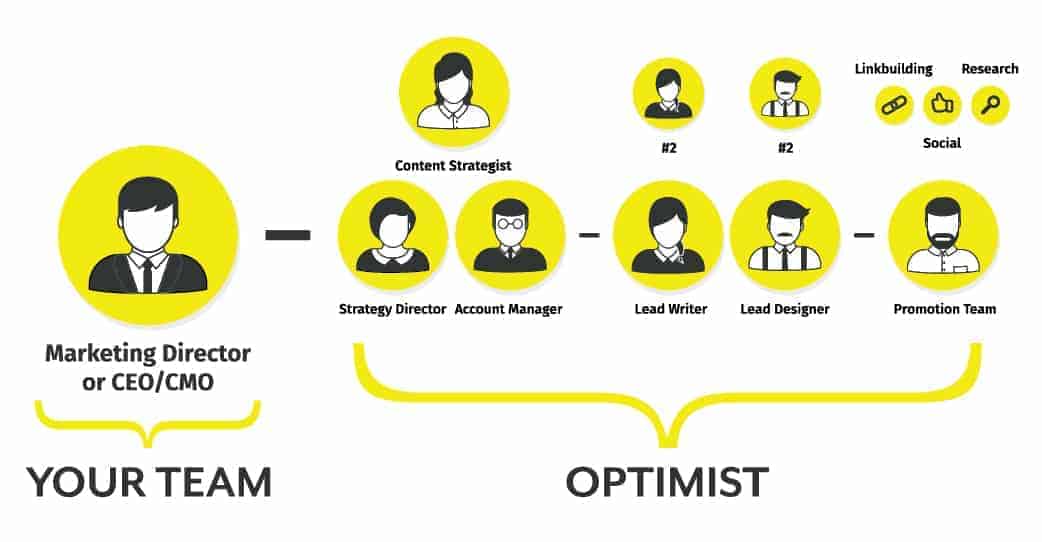
We still try to maintain a generally “flat” structure without traditional agency hierarchy. We don’t have any senior roles or an art director/creative director kind of dynamic. Our team generally has open communications with our clients through channels like Slack and Asana. But, we’ve created a bit more specialization between creative and promotion.
This gives each team more autonomy, too.
Prateek–our content strategist and manager–is still the bedrock of every client engagement. He handles both the project and task management that keeps this whole thing together and takes high-level content ideas and turns them into actual, strategic plans that the team can execute.
He creates a general project brief for every piece of content that we create (which includes both creative direction and promotion ideas/strategy) and hands it off to the rest of the team. Both sides (creative and promotion) are able to use their expertise to iterate on the original vision.
If we create an infographic that was slated to be pitched to journalists, the promotion team may see the final product and decide that it’s a better fit for company blogs or a social channel like Reddit. That’s fine because once the content moves into promotion, it’s up to that team to figure out the best strategy.
By decoupling these specialties, we have a more dynamic process.
People are able to focus on their role and hone their expertise without having to worry about making waves in other parts of the process.
So, as we close out 2018, I reflect back on a year of growth for the firm–we’ve accomplished a ton. We’ve overcome some obstacles and some moments of crisis where things felt like they might truly be falling apart.
Because of this, I feel like we’ve forged a much more resilient team.
As a leader, I’ve also become more resilient. I’ve learned to deal with the stresses and the ups and downs. I’ve learned to cope with the reality that clients will come through our door and sometimes they’ll leave, too. That’s okay. As long as the scoreboard shows that we have more coming than going, we’re doing something right.
We can’t be the right fit for every client. And no matter how much we try to meet their needs or expectations, if there’s a misalignment, it will show its face eventually.
Coming to terms with this has helped me grow as a person. I’ve changed and matured in ways that I didn’t really expect. This year has been an important journey for me.
My Personal Journey Building Optimist
If I’m being honest, year two has proven to be much more difficult for me personally than year one.
First, there’s the increased pressure of running a growing business. There’s also the added stress of juggling more client work, managing a bigger team, and bringing on more people who depend on our success to pay their bills.
This was also the year that I fully made the leap into entrepreneurship. Last year, I padded my income with freelance work and treated Optimist more as a part-time effort because that was all it really required.
This year, it’s become a full-time gig and then some. I’ve found myself struggling to find time to focus on the business rather than working in it to some capacity.
I spent most of the second half of 2018 feeling some level of stressed, depressed, and anxious.
In a word, it was overwhelming.
It’s not that things weren’t going well. The numbers speak for themselves. Even ignoring our relatively flat revenue for the first half of the year, there were no major catastrophes and our revenue never saw a major dip.
But even when things go well on the surface—even when our company is growing and gaining new clients—there’s a lot of stress and anxiety that goes into just keeping the wheels on. Every new client brings new challenges. Every new team member means evaluating our onboarding process and trying to transfer more and more incumbent knowledge.
As the company grows, so does the risk.
Being an entrepreneur, this becomes a constant balancing act. Risk versus reward is the calculus that you do over and over again, trying to figure out how to spend your time and money, where to place your bets, and what it will mean for the future of the company.
You want to be flexible, but not erratic.
You want to be focused, but not obdurate.
It can feel a bit like threading a needle in the dark.
But, all the while, you need to think beyond just what’s going on in your head. When you’re building a company, you can’t just throw your hands in the air and walk away if things get hard. You’ve got to tough it out–make it work.
That turns out to be a bit of scary proposition.
When you hear people talk about bearing the weight of a company on their shoulders, this is what that actually means. It means that as the company grows, it gains mass. It’s harder to change. There’s more responsibility to your customers, to your team, and to anyone else who comes to depend on you and your business.
And, as an entrepreneur, you need to be prepared to bear that burden. No matter what you do, much of the weight will come to rest squarely on your shoulders.
If you get tired or bored or burnt out, everyone else suffers.
If you fail, they lose.
It can feel a bit suffocating.
I have no problem admitting that as a human being, I feel that pressure acutely. I feel anxious and depressed. I feel stressed. Sometimes I take it out on the wrong people. Sometimes I let a stressful interaction spill into the rest of my life.
As a person, an entrepreneur, and a leader, these are things that I grapple with.
There’s no easy solution to stress and anxiety.
The best way I’ve found to deal with the mounting pressure is to remain grounded in what matters. Resist the urge to push away the rest of life, bury yourself in work, and stress about every project, deadline, and dollar.
While this may feel like the way to dig yourself out of a tough situation, I’ve found that it just creates more stress, more anxiety–even dread.
This is not the kind of existence that I want as an entrepreneur.
There’s a reason why I left the startup world with investors and board members breathing down my neck. I want to build a company that’s successful without being overbearing. I want controlled, manageable growth. I want a team that has fun and enjoys their work without insane deadlines or expectations.
Yes, there will be stressful times. Things will not be perfect and rosy.
But, we can be thoughtful about our decisions and shape the company in a way that trends toward sustainable, reasonable work and not growth at all costs. We can take time to put our people and ourselves first before maximizing revenue or profits.
This year, I’ve realized that this is what entrepreneurship is all about.
It’s the freedom to choose.
The trade-off of having the stress that comes with growing a company is that me and my team get to decide the type of company that we want to build. Much of that decision is based on my actions. That means I need to remind myself that I have the power to create the kind of work environment—and life—that I want for myself and my team.
So, as we now have a solid foundation built for our agency, our focus should be on protecting the integrity of what we’ve grown. It should be about shaping our experience in a way that leads to happiness and fulfills the mission of Optimist and our brand values.
That might mean turning down work or walking away from revenue. But that’s okay. That’s entrepreneurship—we have the freedom to choose.
In 2019, I’ll be looking for ways to apply what I’ve learned getting to this point.
Shaping My Role in 2019
If there’s one lesson that I’ve learned in 2018, it’s the importance of removing myself from the day-to-day operations of the business.
In the early days, I played a central role in managing, organizing, and overseeing all of our content production. I would routinely review content and provide feedback, edit articles, or art direct individual graphics.
My role now needs to be about replacing myself.
While I want to keep my pulse on everything we do, it’s just not feasible.
I’m a bottleneck.
My involvement in the day-to-day work slows down the team and actually hurts our ability to deliver good work on a timely and consistent basis.
So this points to two main lessons that I need to carry forward.
The first is trust.
I need to feel confident in our team. I need to trust fully that they will do the best work possible and deliver at a high level for our clients, even if I’m not there to look over their shoulder.
I think this can be a big hurdle for many entrepreneurs, especially ones who begin as a practitioner like myself. But, since day one, I have tried to find people capable of working without micromanagement or rigid structure.
Secondly, I need to get better at shaping my role.
Playing a million different positions and trying to wear every hat in the company is not a good long-term approach for me or Optimist. I need to define what my role will be and then actively work to replace myself elsewhere in the process.
When I’m thinking about how I want to spend my time, it’s really a two-part equation:
- Best use of my time/talents
- Company strategy
Of course, I want to play a role where I am best able to help the company succeed. I want to leverage my experience and expertise to direct our company strategy and put our clients in the best position possible.
But it’s not just about that. My role will also be dictated by the needs of the firm.
If we don’t have anyone else to handle part of the operation, then it falls on me by default.
So, in order to shape my role now and into the future, I need to think about what roles the company will need to fill and whether I want to take them on—or if I need to find another way to cover that part of the business.
It’s ultimately a strategic question about the future of Optimist.
Is our aim to build a large firm with 40, 50, or 100 clients? Then my role will need to be vastly different from what it is today. If I’m planning to remain as the leader of a company that large, then I can’t possibly be involved in the day-to-day work that’s taking place.
This means I’ll need to hire account managers and strategists who can fill my client-facing role while I focus my efforts on hiring, structure, and all of the other stuff that goes into the firm’s growth and success.
On other other hand, our company could grow to that level and I could remain in my current role, bringing in a CEO to run the company from on high.
The truth is that I’m not really aiming to relinquish my involvement in client work.
I want to create something where I get to wear different hats and flex different muscles—as a CEO, as a strategist, and even sometimes as a writer. (But never a designer!)
This does put a natural cap on our trajectory.
If my role remains client-facing and I manage strategy, then there are a lot of things I can’t do.
But, for now, that’s okay.
Our plans for Optimist are not to build a billion-dollar business. We want to focus on culture and grow a fun lifestyle company.
That means that with my co-principal Paul and our current structure, we can service a combined book of 16-20 clients.
Realistically, this represents approximately $1.5MM in annual billings.
Once we get to that point, we can think seriously about the next step.
For now I’m mostly interested in stabilizing and maintaining our current company. We have built an operation that works at this level and I think our focus should be on protecting that before we look at how to grow beyond it.
This means I don’t need to cede all of my day-to-day responsibilities or my involvement in client strategy and planning.
But, I do need to replace myself in a number of key roles:
- Project manager
- Data analyst
- Research/list building
- Sales and account management (for future clients)
Luckily, our team is largely autonomous.
Most day-to-day work requires very little time or effort on my part. And that’s how an agency of our size should work.
But I need to prioritize offloading my remaining roles as a strategic initiative for the coming year.
Improving Team Dynamics
One of the interesting things about our business model is that we’re somewhere between a traditional agency and an outsourcing model.
While we have freelancers rather than full-time employees, that’s not the whole story.
The vision for Optimist has always been to create a “collective”—a group of people who all work together to serve our clients to the best of their abilities.
As we’ve grown larger in size, it’s become a bit more challenging to keep every team member fully engaged in client work without generating a lot of overhead.
It used to be easy to call a quick meeting and hop on to discuss a client’s strategy. But now that we have more than a dozen clients and around 16 freelancers, the overhead involved has ballooned.
Freelancers are hourly. So, any meeting with a full team costs us 5-8 hours of time (roughly $250-600).
So, this presents a challenge for us.
In 2019, we need to get smarter about how we plan and strategize around client work. We need to streamline the process without losing the collaboration that separates us from outsourced operations.
One way that we are doing that is by hosting periodic team retreats.
In September, we had our first one in San Diego.
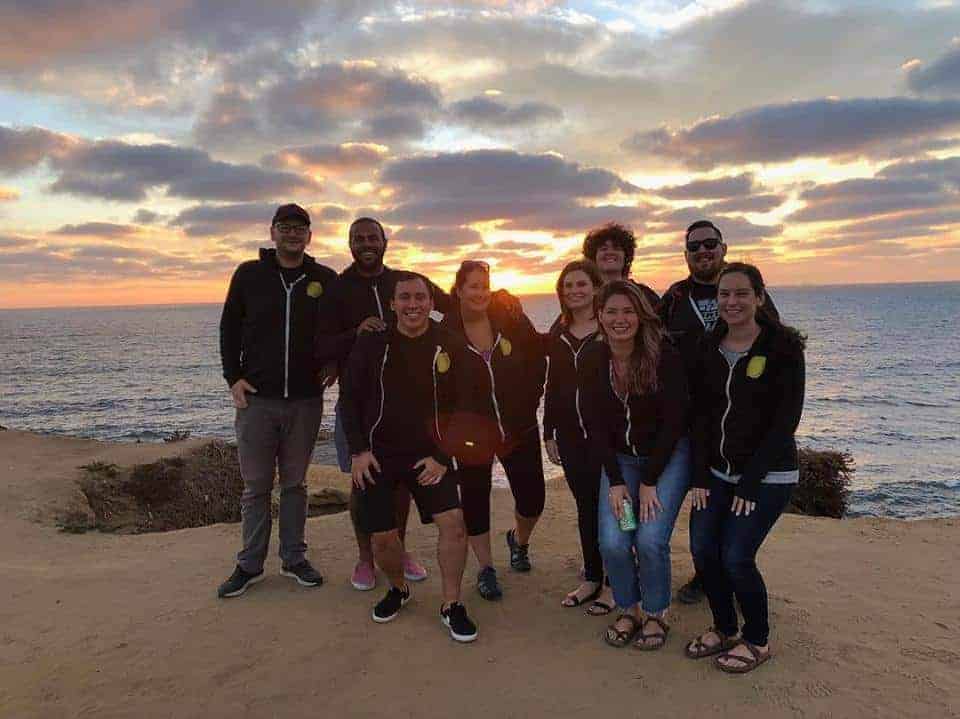
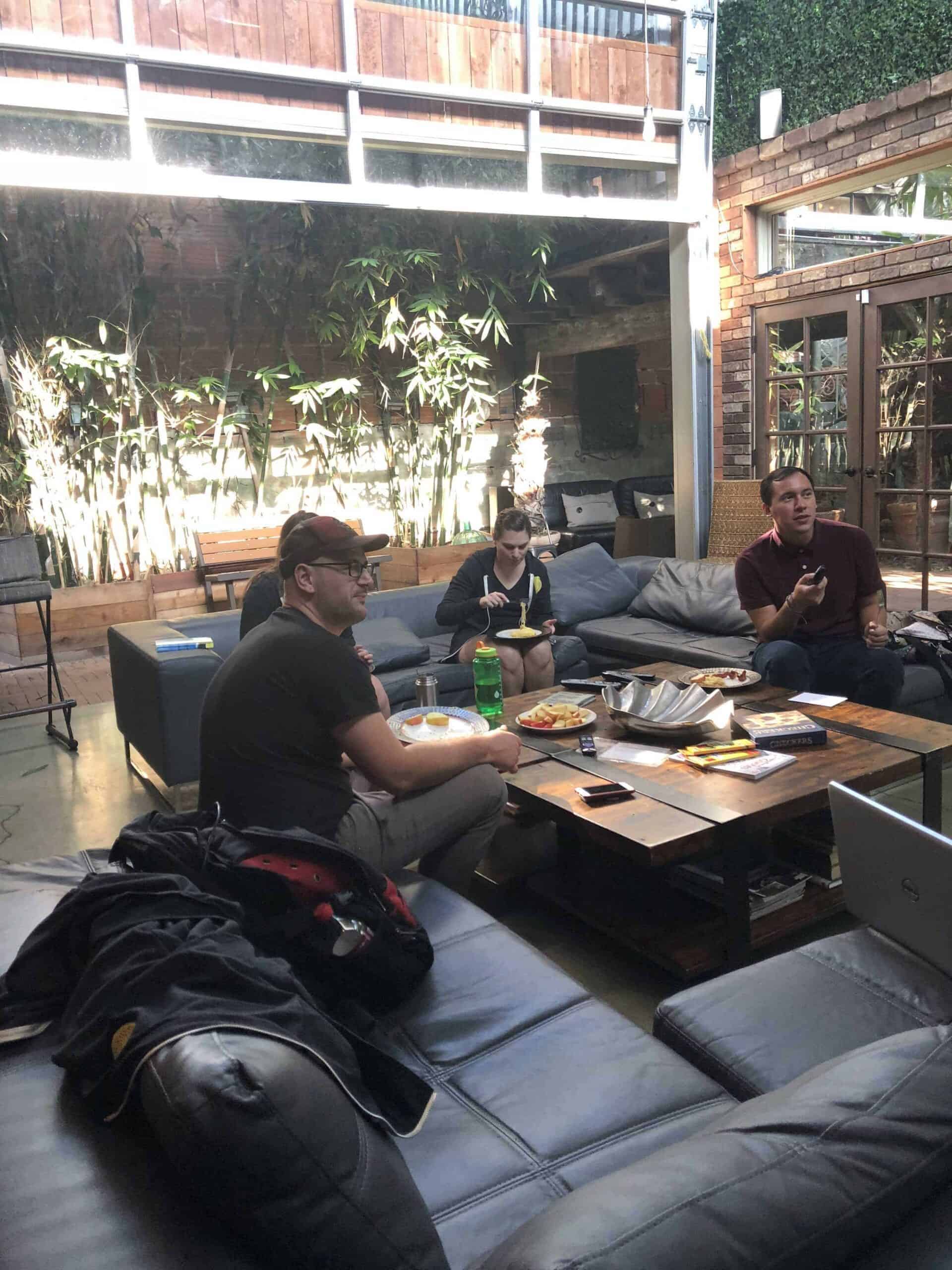

It was a great opportunity to bring our remote team together. And it also allowed us a lot of time to brainstorm, discuss, and plan together—as a team.
As much as I am an outspoken advocate for remote and distributed working, I realize that there are some shortcomings with this model. Collaboration can be stifled without day-to-day interaction and the team can drift apart over time. One of the things we want to do is minimize that.
We are planning our next retreat for April or May.
Building in Time for Analysis
Next, we are rolling out structured, quarterly strategy sessions.
One advantage that comes with content marketing and SEO work is that it’s mostly about playing the long game. It’s actually detrimental to make too many changes to strategy without having time to see the results of work that’s already been done.
So we can take advantage of this by scheduling out client review and strategy every quarter.
In these discussions, we want to do both a tactical and strategic review of our work:
- Which content is working the best
- Where opportunities exist to improve growth
- How outreach/promotion tactics are driving traffic/links
- Any patterns or trends that we may be able to use to our advantage in the future
By baking these quarterly reviews into our process and our budget/pricing, we can reinforce the value that we provide to clients without sacrificing our margins or risking the long-term financial health of the company.
Solidifying Our Financial Position
Another big change in 2018 has been formalizing and professionalizing our financials.
I’ve always focused on trying to keep pretty clean books.
But I’m certainly not a professional CPA or finance manager. As we’ve grown, it’s become more obvious that we need to document and improve our financial strategy. So I’ve taken some steps this year to both strengthen our financial position as a firm and also solidify the way that we track and report on financials.
As part of formalizing our finances, I’ve begun paying myself a flat monthly salary—$7,500 per month.
This has been helpful for me, personally. As an entrepreneur, my finances can be a bit unpredictable. But now that we’re over some of the more tumultuous months, it’s pretty safe to set a fixed salary for myself.
As part of this, I also had to retool our team’s profit share program.
We carve out a percentage of our monthly profits that is distributed to every member of the team.
I changed the way that we calculate profit share by including my salary and our other monthly operating expenses before the final profit share amounts are calculated.
This, of course, reduces the “profit” that we’re reporting and therefore the share that gets paid out. But I also revised our profit share program to increase the profit payout scales and try to offset any downtick in payout for the team.
Here’s what our profit share table looks like:
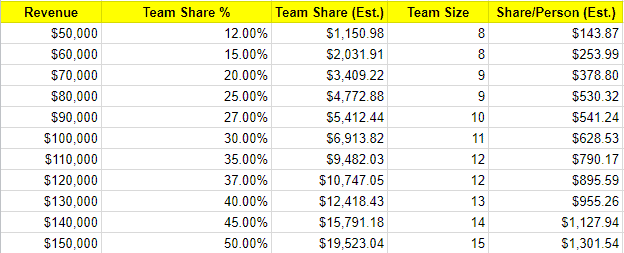
Ultimately, my goal is to pay myself a fair and reasonable salary. We also need some cash reserves as our business is mostly about cash flow. Then I want to distribute the rest—or as much as possible—to the team.
In 2018, we paid out a total of nearly $35,000 in profit share to the team in addition to hourly rates.
This is one of the things that I’m most proud of.
When I started Optimist, I wanted to build a different kind of agency.
Part of my central thesis is that giving people ownership and buy-in will lead to better work and better client outcomes. One of the primary mechanisms for this is a generous profit share program. I want to reward everyone for helping our agency grow and deliver for our clients.
Now, to be fair, there’s no hard evidence that this is actually helping anything.
Maybe I’m just throwing away profit that I could keep in the bank.
But I try to keep my values first and foremost in my decisions.
My goal isn’t to extract every penny of profit from the business. It’s to build an awesome company that people love to work for—and love to work with.
One of the biggest lessons I’ve learned about entrepreneurship is that it’s almost never a science. There’s no guaranteed strategy to success. You’ve got to do what you think will work and then hope for the best.
If the last two years are any indication, I think we might be onto something.
Cheers,
Tyler
Our Agency Sales Process is Broken (And How We’re Fixing It)
Published by Tyler Hakes on May 22, 2018

Every time I sit down to write one of these, it’s like a wrestling match with myself.
How much should I include?
Should I try to hide the ugly bits?
Obviously, I want things to seem as great as possible. Anyone writing about the progress of their company wants to paint a positive picture.
Unfortunately, that’s not always reality.
I’ve written before about the ups and downs we have faced—the ways we failed and what we hoped to learn moving forward.
Today is about writing a similar post. Our first quarter has been good in some ways, but it has been a failure in other ways. After going a few rounds debating myself, I eventually remember the point of this entire thing. It’s transparency—it’s about honesty.
So that’s here we are at. It’s the hard truth.
In Q1 of 2018, our revenue was flat.
We have hit our first plateau. And now we have to figure out how to fix it.
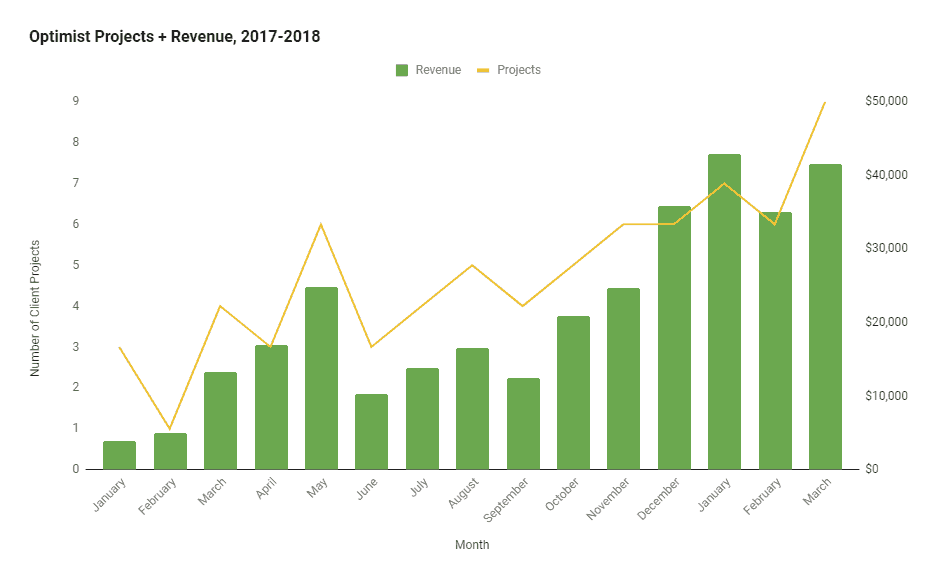
This isn’t exactly what we were hoping for, of course. Our goal is still to 3x revenue in 2018. At this point in the year, we would need to be at around $60,000 MRR instead of our current revenue of about $40,000.
We’re behind pace and need to play catch-up the rest of the year.
But it certainly wasn’t for lack of trying. This last quarter was a frenzy of business development activity. We added more opportunities to our sales pipeline in the last quarter than we did in all of last year.
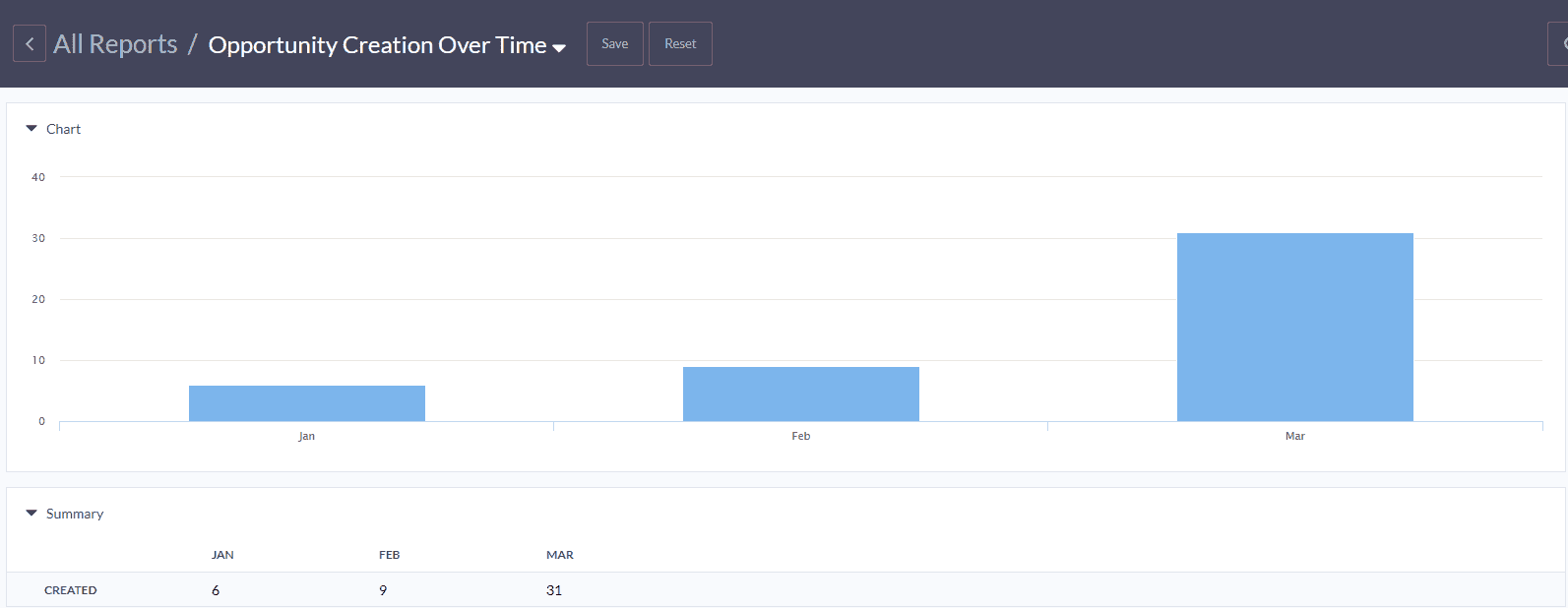
Even though we have been adding a ton of opportunities into our sales pipeline, we have struggled to convert those opportunities into revenue so far this year.
So, why?
The real question for me and our team is what is causing this plateau and how we can overcome it to start growing again.
We need to fix it.
My job for the coming months is to diagnose the problems that are making our sales process inefficient and then figure out how to fix them.
Since this is our most pressing problem and one that I think faces a lot of agencies, I’m going to focus pretty much this entire post on our current thinking around sales, our problems, and our potential solutions.
We have a 5-part plan for how to fix our agency sales process.
1. Rethinking our entire sales communications
When we first began Optimist, almost all of it leads came through the same few channels. They discovered us based on the College Raptor case study that we published.
As such, pretty much every prospect was aligned with the same message and had the same context coming in—they wanted similar results for their business.
So we developed our sales communication flow based on that expectation.
But as we have grown, so has our library of content. And so have the different paths for prospective clients. People come through different content and channels.
Our goal with reworking the sales communication process is to make sure that every prospect has the same expectations and understanding of our work. This means assuming nothing about the content they have read or the job they want Optimist to do for them.
2. Improving nurturing sequence, qualification, and prospecting for leads currently in our funnel
Although our primary focus is on converting opportunities into sales, there is something to be said about the quality and velocity of the inbound leads we can generate.
We have made a lot of improvements to our inbound process over the last few months, but there are still ways to streamline it.
Part of our goal here is not just to get more leads, but to get better leads. Improving the overall close rate for leads that enter into our funnel means we will spend less time/energy on biz dev to generate the same (or more) revenue.
This goes back to our overall business philosophy and strategy. Our goal is always quality over quantity–we want fewer, better-qualified leads rather than more leads and lower conversion.
3. Tying the discussion more closely to value/outcomes
With our prospects coming through a broader range of paths and journeys, it’s obvious that they do not all have the same context about what value we can provide.
Many of the inquires that we get seem to be thinking of us as a service provider first, rather than a partner that can deliver growth.
This is a problem.
Our entire model is built on clients working with us in order to achieve growth and our value-based pricing reflects that we aren’t just a content mill.
So, if prospects are comparing us on a price basis to other vendors, the deal is dead in the water. We can never compete on price—because we never try to. Instead, we need to lead every discussion with value. We need to cast a vision for what we can accomplish together and how it will help drive their business forward.
If the discussion is about how we can help generate 7% WoW traffic growth, it’s clear that we are offering more than just blog posts.
4. Ramping up biz dev and AM capacity
As a business owner and a team leader, a big part of my job is to recognize when things aren’t working and when we need to make a change. Many times, these are not easy or comfortable decisions.
In this case, it means facing my own limitations.
First: I’m not a sales guy. And while I’ve been able to put things together enough to get us to this point, that doesn’t mean that I’ll be able to take us to the next level. (As they say, “what got us here may not get us there.”)
Secondly: I can’t manage all of our clients forever.
As of now, I am the only account manager and I am juggling about 8 ongoing projects. This is close to my maximum capacity and I need to find help before any cracks start to show.
So, we are growing the team. We are adding a new principal who will help carry the business development process and hopefully help us close more of the deals that are getting away from me.
This can be a difficult leap for an agency. Especially when there is only one founder/owner. It means handing over some of the reigns to the thing you’ve built, not to mention cutting into the margins that flow from the business.
Nevertheless, it’s a critical step. No service-based business can scale if everything has to flow through a single person. And my goal isn’t to work 100 hours a week, either. So that means it’s time to expand the team to get us to the next phase.
5. Bringing in a sales coach/consultant
As you can see, we are doing a lot to try to fix the problems with our sales process and keep our pipeline running smoothly.
But, frankly, we’re just winging it.
None of the Optimist team members have much real-world sales or operations experience. This is just our best guess at what we are doing wrong and what we can do better—but that doesn’t mean it’s right.
So we’re bringing in some help.
Much like how we brought in outside help to define and improve our marketing automation and nurturing process, we are also looking at a few different agencies to help us define our sales process, messaging, and communication.
If nothing else, it’s usually beneficial just to have an outside perspective. But I think getting some expert help from someone with more experience than us will definitely help move the needle.
2018 Goal Progress
Let’s take a look back at the goals we set for 2018 and where things currently stand.
Goal #1: $1.5MM annual run rate
Progress: $500k / $1.5MM
Obviously, the most disappointing thing so far this year has been our lack in revenue growth. We’ve been flat (pretty much) for about 3 months. Hopefully we will see more growth in the coming months.
Goal #2: Publish at least 20 posts on the Optimist website
Progress: 5 / 20 posts published
We may be slightly behind on this goal, but generally making pretty good progress.
Goal #3: Publish at least 25 guest posts
Progress: 4 / 25 published
As I’ve focused more on biz dev and agency operations, this has been less of a concern. We are generating plenty of leads, so growing our footprint is less of a priority than doing the actual work right now.
Goal #4: Publish 2 ebooks/white papers
Progress: 1 published
The Agency Growth Blueprint was completed in Q1. I think it’s a great resource that shares some of the insights and strategy that we have used to generate leads over our first year.
Goal #5: Present at 5 events/conferences
Progress: 2 completed; 3 scheduled
I presented as part of the Organic Traffic Conference earlier this year and also hosted a workshop at Galvanize in San Francisco. They asked me to host the same workshop in Denver–which is coming up next month.
Goal #6: Host at least 3 webinars
Progress: None so far
I’d like to put together a webinar series for later in the year to meet this goal.
Goal #7: Launch an online course
Progress: None so far
This just hasn’t been a priority so far in 2018. Still hoping to put something together, but it may be something simpler than the original vision for a course.
Goal #8: Donate $10,000
Progress: $2,500 / $10,000.
As I mentioned originally, we are now focused on making quarterly donations of at least $2,500 to causes the team cares about. So far, we have supported organizations like SAME Cafe in Denver, Farm LA, Save Our Scruff, and Dress for Success.
We’re actively looking for ways to get more involved in giving back and helping nonprofits meet their goals.
An Addendum On Q1 2018 Progress
I started writing this post nearly 2 months ago. It was the end of Q1 and I was feeling very defeated. After tons of work and opportunity, it seemed we were stuck—no new revenue in 3 months feels like a punch in the gut.
So I sat on this post. I mulled over the best way to break the news. And, frankly, I was also just busy working on client projects.
Now we are about halfway through Q2 and things are a lot different.
We have an incredible amount of work in our pipeline. We have signed 3 new clients in the past 30 days. In fact, we are actively considering how we might slow down biz dev to avoid growing too quickly.
That is a much better problem to have.
I don’t want to steal all of the thunder from my official Q2 update. But, suffice it to say that we are on track to accomplish some pretty incredible things by mid-year. And after spending a lot of time mapping out the rest of 2018, it seems like we could make a pretty good run at our goal to hit $1.5mm ARR.
As an agency owner, I think this has taught me that sometimes you just have a bad run—things don’t go well. And what’s important is learning to weather those down times long enough to make it to the good ones. When things get tough, try to remind yourself that the next high might be just around the corner.
This also means insulating yourself—personally and mentally—from the fluctuations. If you take every bad day as a personal attack on your abilities, you’ll burn out quickly. You won’t have the energy left when things come back around. So, protect yourself. Remind yourself that it’s just the nature of the beast. Tomorrow could be the day that everything turns around. But you have to make it to tomorrow to find out.
Live to fight another day, my friends. 👊
Lessons Learned: Growing an Agency to Half a Million ARR in 1 Year
Published by Tyler Hakes on January 02, 2018

Wow.
It’s been an entire year since we first launched Optimist and set out to build a million-dollar agency.
We aren’t quite there yet, but I’ll be damned if we didn’t have a great run in 2017.
Back in December 2016, this thing was mostly a pipe dream. We had a bunch of ideas about what would work and what wouldn’t. Some of those ideas probably turned out to be wrong. But it sure seems like a lot has gone right. It feels like we’re building the agency of the future.
After sorting through some growing pains through the middle of the year, we dug in and evaluated our processes. We found ways to improve our deal flow, identify prospects, and streamline onboarding.
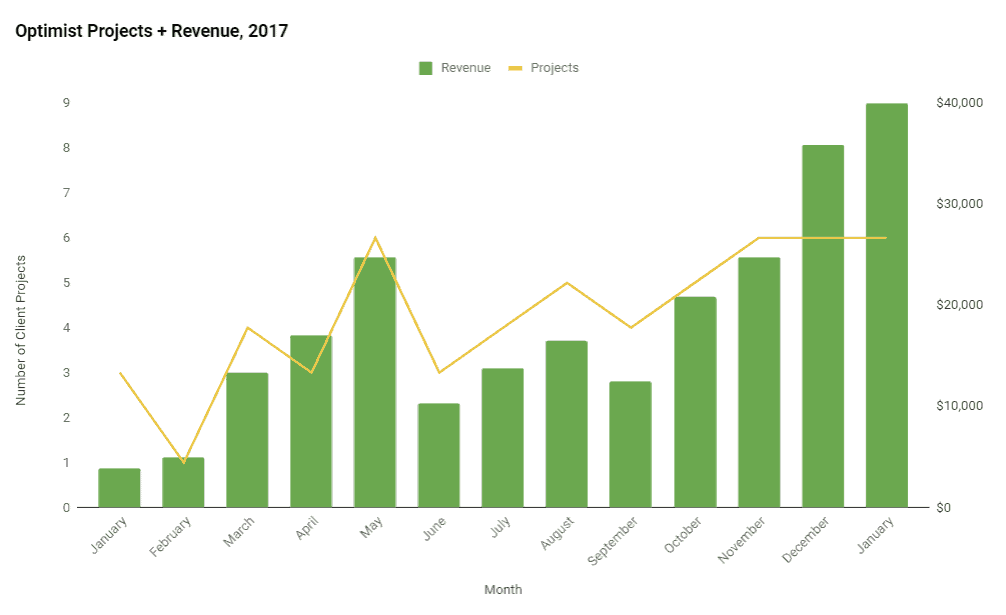
As of January 1, 2018, we have an annual run rate of just under half a million dollars.
It’s been a hell of a ride—exciting, rewarding, and scary at times.
Of course I have to give ultimate props to our team. They accomplished incredible things in 2017. Their work has driven awesome results for our clients and propelled us forward.
It’s worth mentioning that our clients have also been phenomenal.
We’ve been incredibly lucky to attract great clients who have been a real pleasure to work with. Many agencies struggle to keep clients happy or grow frustrated with clients that are needy or demanding. We haven’t had that problem.
Goal progress for 2017
Part of starting a business is learning to deal with change.
Businesses change. People change. Goals change. Everything changes.
That was certainly the case for us in 2017. As we learned and grew as a company, we also had to shift our processes, change our approach, and recalibrate our expectations. Things like mandatory trial projects undoubtedly slowed our revenue growth, but they were a necessary step to set us up for long-term success.
Here’s how things shook out for our 2017 goals.
Goal #1: Sign 10 retainer clients, $100,000 monthly revenue
Progress: 6 retainer clients; $40,000 monthly revenue
Obviously, we did not reach this initial (and lofty) goal for 2017. But, as I explained above, I think that the lessons we learned this year put us in a much better position to meet and exceed this goal in 2018.
Goal #2: Publish 40 articles on Optimist website
Progress: 16/40 articles published
Early in the year, I mentioned that we would probably not be making this goal as we shifted our strategy to focus on publishing a lower number of more in-depth pieces.
Goal #3: Publish 24 guest posts/columns
Progress: 22/24 publishes
A few guest posts are still pending; quite a few ongoing contribution opportunities.
Goal #4: Book 4 in-person presentations or workshops
Progress: 1/4 booked
Pretty much knew that I wouldn’t hit this goal. Most conferences and in-person events have a long lead time (sometimes as long as a year) for proposals. So, I’ve already begun pitching for 2018.
Goal #5: Host at least one joint webinar with strategic agency partners
Progress: Done!
I co-hosted a webinar with my friend Mark Hayes from the Rocketshp growth agency in December.
You can watch the replay of The Growth Blueprint anytime on their website!
Goal #6: Build a list of 5,000+ email subscribers
Progress: 1,500/5,000 subscribers
With our content slowdown, we also saw a slowdown in growth of our email list. As part of 2018, we have plans to get much more aggressive about list building through ongoing retargeting campaigns and an overhaul of our lead generation and marketing automation.
Goal #7: Donate $5,000 to charitable causes
Progress: $1,390/$5,000 donated
No excuses here. I didn’t take the time to make the donations I wanted to for 2017 and by the time the end of the year rolled around and the tax bill came due, it seemed a bit risky from a cash flow perspective to try to make up for the entire year.
For 2018, I’m planning to boost this goal and make quarterly contributions.
Key lessons from 2017
Throughout this process, we’ve all learned a lot.
A big part of the first year of any business–especially a service business, I think–is really figuring things out. You can plan a lot and try really hard to dial in everything before you launch, but you’re bound to run into some challenges and situations that you didn’t expect.
Those are the things that teach you the most.
The key for us has been to be extremely transparent and honest both internally and externally. Identify our problems, call out when things don’t work, and then collaborate on ways to improve.
From that, you can learn both what works and what doesn’t work. You can continuously approve, remain agile, and not get stuck in the kind of slow-moving processes that tend to weight down an organization over time.
Here are our biggest takeaways from 2017.
Lesson #1: Inbound works
Look, we’re a content marketing agency. Obviously, we believe in the idea of inbound marketing. But when you set out to build a new business, it can scary to rely entirely on this approach right from the outset. It feels a bit like you’re just waiting around when you should be out there “doing something”.
But, I can say without a doubt that inbound has worked for us.
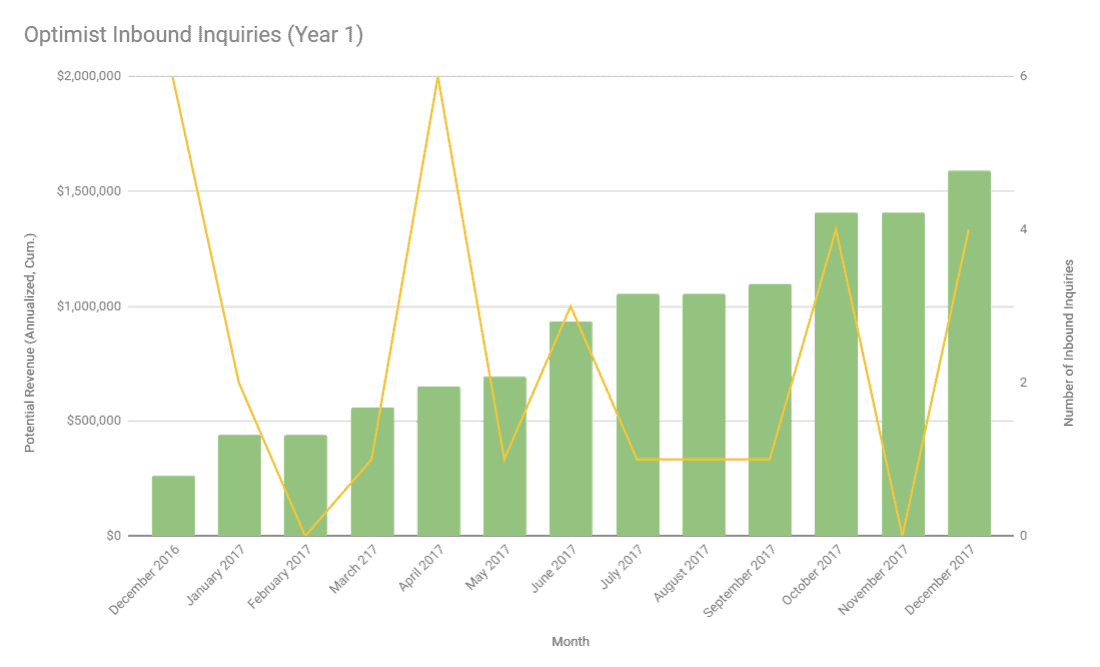
In our first year, we generated nearly 30 inbound inquiries and sales opportunities worth more than $1.5MM in annualized revenue. We did it with almost no outbound prospecting. (I tried some early on; it didn’t go well).
But, most importantly, each person that entered our sales pipeline was already sold on working with us.
They found our website and our content and already decided that they were interested in hiring us. This is such a huge time saver and it makes the entire process easier and less stressful. It’s not a sales pitch, it’s just a conversation.
That’s how we’ve grown our agency from the outset and that’s how we plan to continue to grow in 2018.
No growth hacks, no sales gimmicks, no bullshit.
We focused on doing what we do best–and it delivered.
Lesson #2: Client fit > Everything else
Per the point about inbound leads self-qualifying, we learned early in this process that agency-client fit is probably the most important thing in any relationship.
For one, there are all kinds of different expectations about content marketing and SEO. If the client doesn’t see eye to eye with the way that we do things, it can make for a bumpy partnership. So we instituted mandatory trial projects for all new clients. It helped us filter out clients that weren’t a fit or seemed to be too high-maintenance for our team.
Secondly, if I’m put in the position of having to hard-sell someone on buying our services, then I’m probably in the wrong room.
Knowing myself and knowing that my expertise is not sales, we very deliberately structured our agency and our flow to focus on inbound leads.
Lesson #3: Everyone has unique working styles; use it as a strength
One of the founding principals behind Optimist was the idea of having a flexible, agile team comprising a bunch of full-time, professional freelancers. The idea was to give everyone a seat at the table and the autonomy they need to do their best work.
In practice, that looks a bit different for each person.
Some people like to work 9-5, M-F. Others like to work at nights and weekends. Some of our team likes their work in a big batch; others like to work on stuff at their own pace over the course of a week.
Now, a lot of companies spend tons of time and energy fighting these differences and trying to whip everyone into conformity. And, admittedly, it can be difficult to try to juggle a bunch of different schedules and work styles.
But, we’ve found that finding ways to work those differences in and using them as a strength has been the best way to handle it. Rather than fighting an uphill battle, let gravity do the work. Figure out what works for people and then do what you can to play to their strengths and downplay their weaknesses.
We’ve learned tricks all along the way–how to harness each person’s schedule and work style to help them do their best and help us continue to deliver.
Lesson #4: Each client is unique, too
Along those same lines, a huge part of any service business is understanding your clients and their individual needs. Luckily, we really only sell one “thing”. So, for the most part, our day-to-day work stays about the same. But communication and management style can vary wildly.
We work with busy startup founders who are wearing 23 different hats already–they want a regular update with bottom-line numbers. On the other hand, we work with content folks who love to talk shop and trade jokes and ideas with the team.
Each of these is unique. If we give them all the exact same experience, then only a small portion will be happy and everyone else will feel like we aren’t delivering what they want and expect.
We try to be as accommodating as possible. We try to read and understand each client’s needs and wants–then deliver the kind of experience that makes the most sense for them.
At the end of the day, you aren’t just selling time or content or ads or whatever. You’re selling yourself. You’re building a relationship that’s nearly as important as (or maybe even more important than) the work itself.
Learn your team, learn your clients, and learn how to put everyone in the best position to succeed.
Lesson #5: MRRREAM (Monthly Recurring Revenue Rules Everything Around Me)
Last–but certainly not least–we learned the power of the monthly retainer.
Our goal from the outset was to work on a retainer basis and build the business this way. But, 2017 just affirmed that idea.
You likely noticed in our monthly income report that we had a lot of ups and downs over the first half of the year. It was frustrating. Not only do you want to see your revenue grow in a consistent way, but having unpredictable income makes it nearly impossible to plan for the future.
For us, this instability was often caused by project work.
We had a number of opportunities that were not a source of long-term, ongoing revenue. They were one-off projects that gave us a temporary boost to the books. Since we were a young, hungry company, we took on a lot of that work early on. This was the wrong choice.
It created instability and unpredictability in terms of both work and income. It put us a fundamentally different path from the one we set out to follow.
That will change in 2018. No more project work.
The only one-off projects will be the mandatory pilots at the start of every new engagement. But, we won’t be picking up anything else unless it will lead to steady, consistent revenue.
Our agency goals for 2018
This has been a hell of a year.
Lots of amazing progress. Tons of learning. A few mistakes. But, all in all, I think we are poised to really roll into 2018 with a vengeance. I know that, personally, I feel a renewed sense of urgency and I’m excited to take on new challenges in the year year.
So, for 2018, we’ll be pumping up our goals.
Goal #1: $1.5MM annual run rate
Knowing that we haven’t reached our initial goal of $1 million, it may seem nuts to raise the bar for 2018. But I don’t think so.
First of all—we’ve learned a ton. Many of the early missteps and process problems have been discovered and resolved. Now we’re smarter and more efficient. We can focus on driving sales opportunities and not on figuring out the sales and proposal process from scratch.
Second of all, we already have more traction going into 2018 than we did coming into 2017.
As of the time of publishing this, we have at least 4 opportunities in our sales pipeline and a clear plan to overhaul our lead generation strategy and built up a solid flow of new ones in the coming months.
Goal #2: Publish at least 20 posts on the Optimist website
This one’s pretty straightforward. We have an editorial calendar planned out for most of the year and I’d like to have a consistent flow of new content on the site every 1-2 weeks.
Goal #3: Publish at least 25 guest posts
Now that we have contributor access to many websites, this should be no problem.
Goal #4: Publish 2 ebooks/white papers
We’ve offered content upgrades as our main lead generation tactic, but this year, I’d like to roll out at least two proper ebooks, guides, or white papers.
Goal #5: Present at 5 events/conferences
Bumping up my goal from last year. Since I have more lead time this time around, I’m hoping we make better progress.
Goal #6: Host at least 3 webinars
I had a blast presenting at the webinar with Mark from Rocketshp. This year, I’d love to do more of them.
Goal #7: Launch an online course
Here’s something new for 2018.
I want to launch an online course on content marketing strategy. This will mean compiling and writing everything I know about how to build a killer content marketing strategy—then putting it together into something awesome and valuable.
Stay tuned as I figure out exactly what this looks like.
Goal #8: Donate $10,000
I fell short of my goal for 2017. Cash flow was a bit less predictable than I hoped for most of the year. Again, we begin 2018 on much more stable ground—with a stable of clients, predictable revenue, and a pipeline for growth.
As such, I think we should have no problem committing to donate more this year than last.
As part of this process, I’d like to make quarterly contributions of $2,500. That will help me stay on track.
All in all, I couldn’t be more excited for what’s to come in 2018.
Through the ups and downs over the last year, it has undoubtedly been the best year of my life. I feel like we’ve built an amazing team and an incredible vision for the future of agencies.
If you’re building an agency, a service-based business, or any kind of company, feel free to share your goals and lessons in the comments. I’d love to learn from you.
Here’s to an amazing year.
✌
Top photo © Simon Cory
The Ups and Downs of Growing a Content Marketing Agency
Published by Tyler Hakes on October 11, 2017

I almost didn’t write this.
Looking at our numbers, I wanted to wait until we hit our goals–or at least had a clear trajectory–before I published another article revealing what was happening behind the scenes.
On top of that, I never felt like I had the time to write another one of these entries for the Agency Journal.
If you run an agency, you probably understand. You wear a lot of hats. You’re running around, trying to do 50 different things for clients, recruiting talent, and also keeping the plates spinning internally. Oh, and you probably try to live a life, too.
But, my girlfriend reminded me of something important.
Transparency matters.
Rule #2 from our values: Be human.
In order for this work, I need to share the good parts of our progress–and the bad ones.
It’s been nearly seven months since I last updated our agency journal and announced our goal to grow a $1,000,000 agency in a year.
Suffice it to say that a lot has happened. I’ve learned a lot, both good and bad.
Since the last update, we’ve grown a bunch and generated a lot more interest. Our own content has continued to bring in inbound leads, which has helped us grow our revenue.
But, we’ve hit a lot of barriers.
Unfortunately, we are a long way from our initial goal of building a $1 million agency. And I bear most of the responsibility for that. Our team has continued to deliver great content (and some amazing results) for our clients. But, it has been a struggle to translate all of the interest that we’ve received into actual work for the team.
Let’s talk about what I’ve learned.
Leads don’t mean sales
This may be obvious to anyone else who has run an agency or service business, but I am quickly learning just how true it is.
Since our official launch, we have had at least 34 sales opportunities that have entered our pipeline. (I’m only counting people who have reached out to us about working together).
According to my records, we have turned away or referred about one third of those leads.
Of the remaining 70%, we’ve had various levels of success.
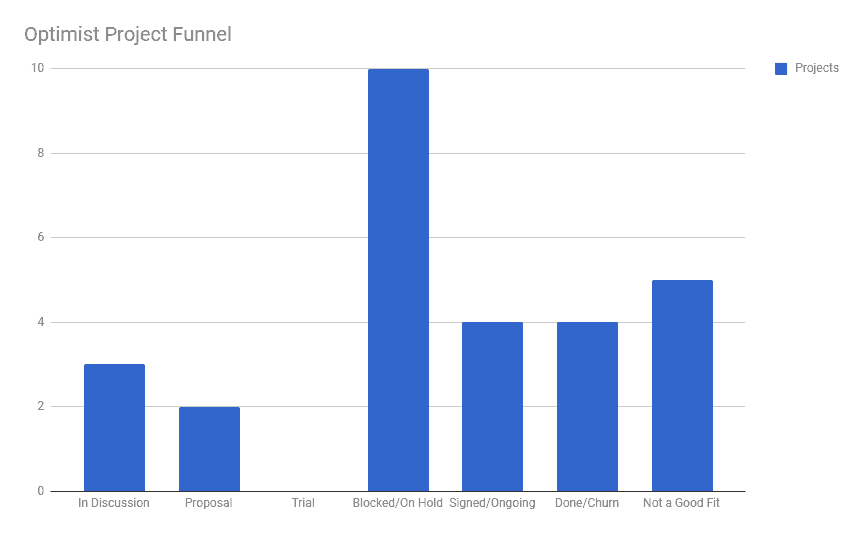
When looking at our pipeline of leads/sales, one thing sticks out like a sore thumb. We have way too many deals that are somehow stuck, on-hold, or blocked. Most of these are people who were gung ho to move forward and happy to hire our team.
But, something is holding it up.
It might be the final approval from an executive, temporary cash flow issues, or changing internal dynamics. But this bucket easily represents $30-40,000 per month in revenue, which is stuck in limbo.
Will the deals close?
I think our agency is too young to know for sure. Many have expressed interest in still trying to move forward, but there’s no telling when that may happen.
A few months ago, I shared that our team has decided to require a mandatory trial project for every new client.
This move came from some early experiences we had with specific clients not being a good fit or not having a shared vision or expectations.
The post goes into more detail about the decision, but it basically provided three things:
- Protection for our clients
- Protection for us (from shitty clients)
- Focus on long-term health and growth
As I explained in the original article, one of the most difficult parts of running and growing an agency is uncertainty. Losing clients can be devastating to any agency, so we want to avoid it as much as possible.
So, trials have served their purpose. We’ve had a chance to work with each of our potential new clients first and see how things go, and then decide whether or not we should move forward.
But, unfortunately, this also means that our growth and revenue have suffered. In addition to many of our projects being put on hold and our high standards for clients, we’ve seen a number of clients that didn’t turn into sustainable income as expected.
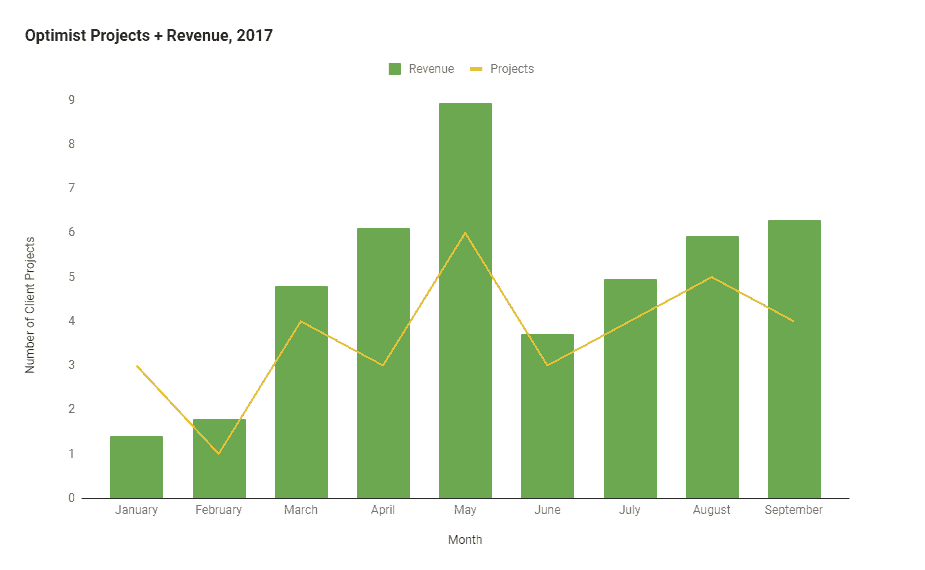
The key for us moving forward is to refine this process.
We need to do a better job of closing deals. Ultimately, that falls on me. I’m the salesperson for Optimist.
We need to do more to keep the pipeline flowing and to qualify clients even before the trial project, in order to make sure that they translate into paying clients past that point.
I consulted my incredible team. They’ve come up with some great ideas.
Improving the sales process
The first and most obvious adjustment I’m making for the rest of the year is to try adjusting our sales process.
I’ve identified a few opportunities to streamline and I am hoping that it will lead to us being able to close more deals more quickly:
- Bundle the trial project into a retainer agreement, getting sign-off before beginning any work
- Present proposals in a phone meeting (rather than simply sending via email)
- Schedule follow-up meetings before hanging up
Each of these small adjustments is meant to improve the flow and our overall conversion rate from inquiries into clients. (Right now, we’re at about 10% conversion for the year.)
I’m planning to continue to refine this process and may hire a sales coach or consultant to help.
Adjusting for smaller packages
One of the biggest barriers that we have run into with regard to scaling revenue as quickly as we expected is that the deals we have signed have not been as large as we had expected.
In my initial post about our goal to build a $1 million agency, I laid out the math: 10 clients at $10,000 per month = $1.2 million run rate.
Since then, I’ve learned that the pool of companies willing and able to pay a full $10,000 per month is fairly small. Most of the inquiries we have gotten come from companies with a budget closer to $5,000 per month.
Because of this, we’ve shifted our expectations.
I updated the website to say that our work begins at $5,000 per month instead of 10. My hope was that we’d capture more inquiries this way. And, frankly, we were discussing deals below $10k/mo with most inquiries anyway.
Obviously, this means we’ll need more clients in order to reach our goal.
Being more aggressive with lead generation
I’m not a salesperson.
But, as the head of any agency quickly finds out, sales becomes almost your entire job.
Thinking back to my approach and my own skills, I’ve realized that sales has definitely been a weakness of mine. As such, I want to make some changes.
In order to try to scale our agency faster, I am going to get more aggressive about generating and following up with leads. I’m taking a few specific steps to make this happen:
- More aggressive lead scoring (via Drip)
- Shorter time for follow-up with new subscribers/leads
- Paid content promotion
- Retargeting campaigns and content funnels for prospects
I’m hoping that these changes will allow us to put more opportunities in our pipeline. So, even if we only end up closing 10% of the deals that enter, we’ll still be able to add several new clients before the end of the year.
Shifting our content strategy
Our content and marketing strategy for Optimist has been much the same as what we would prescribe to a client.
We were (are) churning out content targeted at reaching our key buyer personas, doing content promotion/distribution, link building, etc. It has worked well.
All of our business to date has come from inbound leads generated through our own content.
But, as most agencies probably know well, it can be difficult to invest the time and money into your own marketing efforts when you’re trying to keep on top of client work, plan for the future, and stay focused on steering the ship.
I’ve decided that for the remainder of the year, I’ll focus on creating and promoting 4 key, cornerstone pieces of content (each consisting of a few relevant articles and some curated resources).
This will allow us to do a few things:
- Create targeted landing pages and funnels specifically designed for each segment of our target market
- Give us a way to focus our content on each market
- Alleviate the need for constant content production
- Create long-term value for us via the content and funnel
Although a lot of our clients rely on continuous content in order to keep traffic flowing and to build out their organic search footprint, our business is much lower volume than many others.
We are really only looking for a steady flow of new business. Our goal is to reach 10 to 20 clients–not a million users. Because of this, I think it makes the most sense for us to build a content library up front and then slow down our content publishing schedule moving forward.
So, for those reasons, we are shifting our strategy to focus on fewer, bigger content resources rather than a continuous stream of new content.
Since we are still growing our own footprint, I’m going to shift a lot of my time and effort on content toward guest posting on other sites. This will help us generate more brand awareness and earn links and traffic to our site.
People and operations
The biggest update from a people and operations standpoint is that we now have officially moved all of our work to a new project management software–Asana.
Our “light” stack using Slack, Trello, and Google Sheets was effective when each of our freelancers was working against a single Optimist client at a time.
But, once we started to have writers and designers working on multiple clients, it became really difficult for them to track all of their tasks and due dates across multiple client Trello boards. Asana adds the individual task management view that we were missing with Trello, letting a writer or designer, for example, see all of the projects they are assigned in chronological order by due date, regardless of which client it’s for.
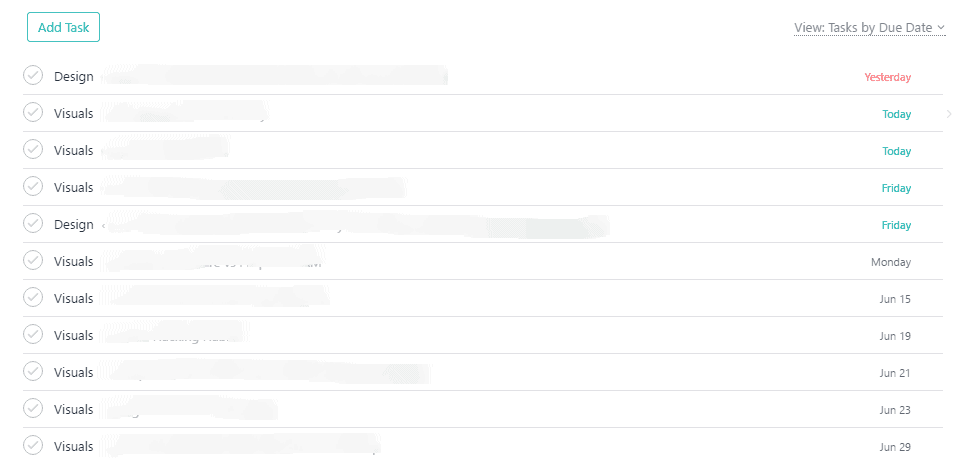
Moving forward, this will be essential. We migrated just before bringing on a few new clients, which I think was perfect. As soon as we recognized that Trello wasn’t providing an adequate view for everyone to stay in sync, we evaluated our options.
We had already been planning to consider adding a different task/project management solution to our stack. But, this accelerated the need for a new tool.
So, now we use:
- Slack – Communication, discussion
- Asana – Task + Project management
- Google Sheets – Editorial planning
I did consider a few other project management options. I investigated some tools like Percolate, built for content marketing management specifically.
But, ultimately, the other options just felt too rigid.
One of the core aspects of Optimist is being agile–removing beauracracy. Having a full-blown task/project management software at all felt a bit heavy and bloated to me. But these content management tools just felt way too rigid and restricting–like we would have to mold our processs to their tool, rather than their tool working the way we want it to work.
Asana seemed to strike a decent balance, giving us a lot of flexibility to bend the tool to work the way we need it to work.
Goal Updates
Here’s a quick breakdown on progress for each of my high-level goals for the year. Some are going along smoothly. Others are a bit behind.
Goal #1: Sign 10 retainer clients, $100,000 monthly revenue
Progress: 4 retainer clients
There’s really no beating around the bush on this one.
We’re pretty far off from reaching our goal by the end of the year.
But, if we can rekindle some of the leads that are currently stuck in our pipeline and add some new opportunities, I think that we can realistically expect to hit at least 50% of our revenue goal before the end of the year.
This will take a lot of work–and probably some luck–but, I think’s plausible at this point.
Goal #2: Publish 40 articles on Optimist
Progress: 14/40 articles published
As mentioned above, we have changed part of our content strategy. Because of this emphasis on fewer, high-quality posts, I am guessing that we will land somewhere around 20 posts for the year.
To make up for this, I’m going to bump up our goal for guest posts.
Goal #3: Publish 24 guest posts/columns
Progress: 12/24 guest posts/columns
I have maintained a fairly health guest posting and writing schedule, pitching posts to a number of outlets and websites throughout the year. But, the bulk of my guest posting has come from my monthly column on StartupNation.
Once we finalize our content schedule for the rest of this year, I’ll build out a guest posting plan that tracks with our focused content for each month.
I’d like to increase this goal to approximately 30 targeted guest posts in 2017.
Goal #4: Book 4 in-person presentations or workshops
Progress: 1/4 booked
Unfortunately, I think I missed much of the window for events in 2017. Many of the deadlines to submit proposals ended in the late spring or early summer.
That being said, I have already begun to submit proposals for a few late events this year and early events for next year.
I did have the chance to give a presentation earlier in the year at DFWSEM. (Thanks for having me, guys!)
Goal #5: Host at least one joint webinar with strategic agency partners
Progress: In the works!
We have not yet announced the event, but I am currently in the planning stages of a joint webinar with a strategic agency partner–should be fun!
Goal #6: Build a list of 5,000+ email subscribers
Progress: 1,400/5,000 subscribers
We may do a small, paid lead-gen push in the coming months to help bolster our list. But, so far, it has grown steadily every day through our content marketing and content upgrades.
Goal #7: Donate $5,000 to charitable causes
Progress: $390/$5,000 donated
This is probably the goal I am most disappointed in my progress on so far.
We’ve had limited cash flow to put toward any particular cause. Although I’ve made a few small donations throughout the year, I am hoping to come up with some kind of bigger campaign or cause that we can invest in before the end of the year.
Have ideas for a great, worthy cause? Leave it in the comments!
Follow along as we grow a $1,000,000 agency from scratch
Sign up for updates from our agency journal. We’ll never send you spam or BS.
I Was Having a Really Shitty Day. Here’s the Simple Trick I Used to Turn it Around
Published by Tyler Hakes on September 07, 2017

Have you ever had one of those days where everything is going wrong?
I’m sure you’ve been there.
It’s one of those days where the work you completed weeks ago seems to have magically vanished from your computer. Your website crashes. You realize that the incredibly important email you “sent” last week is still sitting in your drafts folder, unsent. Then you find out that one of your projects is running behind schedule.
This just happened to me the other day.
It was just one of those days where nothing went right. Everything that could go wrong seemed to, indeed, be going wrong (thanks a lot, Murphy).
Technology wasn’t cooperating–I couldn’t get some basic functionality on our site fixed and working properly. But even worse, I had a bunch of pending tasks I was working on that I couldn’t complete until I figured out the tech issues.
I was having a shitty day.
It was frustrating. Everything I tried seemed to fail and I was losing faith. I was about ready to just walk away and call the entire day a loss.
After spending a few hours running into walls and feeling frustrated, tired, and defeated, I decided to refocus my energy. I went back to the calendar and my task list to see what other items were pending.
That’s when it hit me.
For months, I had one task on my to-do list that kept getting pushed back.
I wanted to research and formalize a reward system for our team. They do amazing work every day and I always try my best to acknowledge it. But, I wanted to do more to show them how much I appreciate their work.
What I needed to figure out was some kind of reward mechanism where I could provide micro-bonuses to people for doing an excellent job.
But, I had put it off. And off. And off again.
Like many other business owners, I often feel overwhelmed by a list of pending tasks and projects that’s a mile long. And as soon as I dig myself out of the backlog, I turn around to find that there’s a another pile of work waiting for me to do.
Because of this, many things–even really important things, like rewarding my team–can often get pushed to the back burner.
I could tackle this project for employee rewards, but I still have those 2 proposals to send, client research to do, and that blog post I’ve been meaning to write for the last 3 weeks.
But, at this moment in time, I realized something.
It occurred to me that not only did I need to do a better job of prioritizing things that matters for my team’s happiness, but that focusing on improving their lives and creating a better work environment is something that I can do to relieve some of the stress and frustration that comes when nothing else seems to be working out.
Although I had been angry and frustrated for the entire day, as soon as I turned my attention to our people and trying to improve their lives, everything turned around.
My shitty day got a lot better.
For the first time all day, I actually felt like I was accomplishing something worthwhile.
This small thing–and, admittedly, it’s very small in the scale of possible reward programs–felt like a huge deal to me. And I felt like the team appreciated it as well.
For such a small investment in time and money, I felt like I was unlocking huge returns. One of the really core elements of Optimist is about treating people like they matter–”be human”, as our ethos says.
That means that when technology sucks or processes break down, we have to find the humanity in it all. We’ve got to find the part that matters more than anything and then put energy toward that.
The simple trick that I learned to turn around my shitty day was to take time to remember this and then focus not on the minutiae of day-to-day tasks, but think bigger about how to make people feel better.
By helping other people, I was also helping myself.
Focus on the people
As a manager, CEO, or founder, our job is to give people the right environment to do their best work.
That can take a lot of forms. But, I am a firm believer in the power of small gestures, recognition, and reward. Our company can’t afford to give out lavish bonuses or big-ticket gifts. But, when someone does a great job, I want them to do know that I appreciate their time and effort.
If nothing else, I can tell them thanks and buy them a beer–or a taco.
Being a remote team, that’s a bit difficult. I can’t literally take people out to reward them for work well done or order lunch for the office to celebrate a big win.
But, I’ve found what I think is the second best thing.
It’s an app for Slack called HeyTaco!.
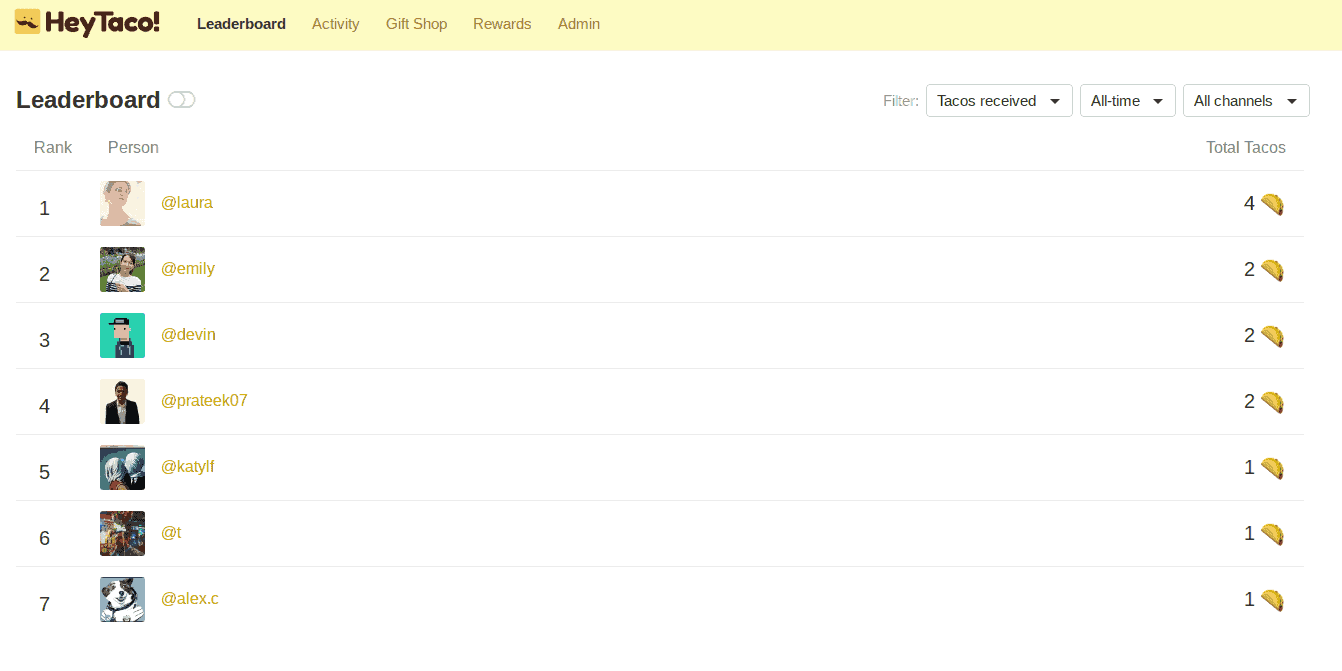
Our team has actually been using it for some time as a symbolic high-five for work well done. But we hadn’t really embraced it as a matter of process.
This week, I changed that. I created our first real reward. I gave members of the team the option to redeem their tacos for a gift card of their choice (hopefully for real, delicious tacos!)
So, that means that every time someone does a great job on a project, I can send a taco their way and it’s like a tiny financial bonus. It’s not a million dollars, but I hope that it shows that I care enough to reward them for their work.
I read a lot of bullshit on the internet about “hustling” and working 100-hour weeks to build a business. But, I’m not that kind of leader. I work hard, but I rely on surrounding myself with other smart, talented people to make things work.
So, to me, one of the best ways I can spend my time is not killing myself to write 50 blog posts a week. It’s investing in the people that make the business work and finding ways to help them feel good about the work they’re doing.
That’s how I regain my energy and keep myself focused on what really matters.
When I’m having a shitty day, I want to make someone else’s day a bit brighter.
Focusing on people took me out of the funk I was in and gave me a sense of accomplishment and pride that I was doing something to help someone else.
And, when it comes right down to it, that’s what really matters the most.
Quick note about the Agency Journal:
When I first created this agency journal section on our website, I had big plans to lay out a fully transparent look behind the curtain of our organization.
Unfortunately, I’ve fallen behind on that goal (remember that post I had been meaning to write for weeks, that I mentioned up above?) We’ve had some great successes along with our fair share of setbacks. But things are going well. We’re continuing to grow and learn new things every day and we are still on track to achieve our goal of building a $1 million agency. It may not happen exactly within 1 year, but I feel confident that we will get there in the coming months.
I am planning to get back to this section of the site and do a better job of posting regular updates.
If you’d like to sign up to see how things are going, use the form below. I won’t send every entry here to our full email list. So, even if you’re already a subscriber, sign up there to make sure that you get all of the Agency Journal updates in the future.
How Fear of Failure Drives Bad Management
Published by Tyler Hakes on May 03, 2017

Have you ever noticed how job listings often ask for candidates that are “entrepreneurial,” “driven,” and “self motivated”?
What they’re really saying is that they want to hire someone who will think of the company like it’s their own. People who will do whatever it takes to get the job done–not because they’ve been told to do it, but because it will help drive the company forward.
This is incredibly valuable.
If your entire company felt motivated like the company was their own, they would undoubtedly be more productive, more effective, and more committed.
But, there’s a problem.
The same companies that post these job listings looking for “entrepreneurial” candidates turn around and put these people in roles that are actually the opposite. Most roles in most companies are quite inherently unentrepreneurial.
Companies hire “entrepreneurial” people to sit in cubicles and take orders from the boss all day.
What gives?
Holding on too tightly
Most companies that say they want to hire “entrepreneurial people” never treat those people like entrepreneurs.
Instead, they micromanage them.
They give them narrow roles and specific instructions and then watch over their shoulder to make sure they’re doing exactly what they were told. They make them track every minute of their day and clock in at a special time every morning.
In this kind of environment, work quality and responsibility don’t matter–just that you follow the rules.
And this is the problem with how creative, entrepreneurial people are managed.
Actual entrepreneurs aren’t micromanaged and given small menial tasks to check off of a list each day. They have the full picture of what is trying to be accomplished and then they have to create a plan–right or wrong–to get there. So why do companies say they want to hire “entrepreneurial” people and then never give them the chance to be entrepreneurial?
Because they might fail. And that’s really scary for most companies.
Most companies are afraid that they’ll give people entrepreneurial freedom and they’ll make the wrong choice or fail to accomplish what they’re supposed to do. So, instead, they create very specific, narrow jobs and tasks. They take creative thinkers and problem solvers and put them into roles where responsibility is so narrow that they can’t possibly screw it up. They turn them into cogs.
But this thinking becomes pervasive in company culture–it’s poisonous.
By micromanaging the hell out of employees, what we’re really saying to people is, “I don’t trust you to figure this out on your own.” And that lack of confidence echoes loudly, turning an otherwise driven and creative person into just a shell of themselves.
We’re so afraid to fail that we hire people who are entrepreneurial and then tell them what to do all day.
Then, they either get pissed off and leave or we grind down their self-drive to the point that when we really need them to come through or think for themselves, they’ve forgotten how to do it.
Repeat this over the course of a career and people become apathetic, lazy, and irreverent about anything other than clocking in, earning a paycheck, and clocking out.
Employees feel undervalued, unappreciated, and unimportant. They’re conditioned to not give a shit about their jobs by jobs that don’t give a shit about them.
That’s not to say that all management is bad. Structure and process are important and great managers serve as leaders and mentors.
But the paradox of management is that what often passes as good management–top-down directives, strict marching orders, and tight adherence to corporate policies and procedures–is actually what zaps the power and motivation from your team.
The tighter you try to control things, usually the shittier things turn out.
I think the key to effective management is to resist those urges. It’s to let go.
Give your people the freedom to operate in a truly entrepreneurial way and to solve problems and create value with their knowledge, skills, and talents. This may be scary in the short run, but it gives people the ability to grow and learn, developing more skills and more capacity for self-management.
It’s about investing in people.
Letting go
This whole article basically boils down to one main point: Hire good people and trust them.
I don’t have any magical formulas or secret management strategies that will help you turn “ordinary people” into extraordinary performers other than to get the hell out of their way.
In most cases, I don’t think it’s a problem of people not being smart enough or driven enough or talented enough. I think that most people are so used to being treated as subservient employees that they become task-doers rather than problem solvers. And the only way to reverse that is to trust people to solve problems on their own.
As a business owner, this should be the goal anyway. Micromanagement is not an effective way to build a business–you end up spending all of your time giving specific tasks and instructions to the people you hired to think for themselves. That’s a pretty bad way to run a business.
So, instead, I let go.
I give people freedom and ability to think, create, and do. When important things are on the line or projects feel like they may be losing direction or are getting stuck, I offer some help if it’s needed. Then I step back.
My management process isn’t really to manage people at all. I see my job as being to manage the dates, projects, budgets, and processes that help people do their best work. Then, let people manage themselves.
I try to stick a few basic rules:
- Give specific deadlines and dates
- Assign goals, not tasks
- Flatten hierarchies
- Answer any and every question
- Provide direct and honest feedback
- Create systems that help people work better and more efficiently
- Get the hell out of the way
I would be lying if I said that my instincts don’t sometimes urge me to jump in and tighten the reigns. I think that’s only a natural response, especially for the type of people who are used to being in charge. But, I fight that need for control and remind myself that trusting people to do what they’re supposed to do is the best policy.
As far as I’m concerned, the best type of management is the one that gives as much power as possible to the people who do the work and gives them the freedom to explore and create.
My motto is simple: Trust more. Manage less.
Top image via Freepik.
What the SaaS Industry Taught Us About Running a Content Marketing Agency
Published by Tyler Hakes on April 18, 2017

I spend a lot of time on SaaS websites.
Between looking at various tools for our own use and checking out sites from companies that we’d like to work with or would like to work with us, it’s safe to say that I’ve seen hundreds, or even thousands, of them.
There’s one thing that almost every SaaS website has in common. It’s so obvious and ubiquitous that you may just take it for granted at this point–it’s something you just assume is there and then forget about it (unless it’s not).

Groove’s website
Almost every SaaS website offers a free trial.
It’s pretty much industry standard–and it makes total sense why SaaS companies almost universally let buyers try their product out first.
A free trial offer helps the SaaS company because they can build a pipeline of prospective buyers and get them to try their service with no risk. And it’s almost a nonstarter these days for customers. Even though the risk is relatively low, people are still super hesitant to whip out their credit card and buy a product that they’ve never used or, in some cases, even seen.
So why don’t other industries have trial offers?
I can’t speak for the every industry, but from the perspective of an agency, this seems like a big oversight and one that’s likely rooted in a lot of fear and mismanaged expectations.
How agencies (usually) work
In many cases, agencies are talking about having clients sign contracts for somewhere between $1,000 and $100,000 (or more). Often times, they’re on a monthly basis. And sometimes they even lock in clients for a contractually mandated minimum number of months (or years!)
And they expect clients to sign on for these deals–in most cases–without having ever actually worked with the agency. They expect customers to buy without trying.
It just doesn’t make sense for any company–especially a startup–to shell out money to hire an agency without ever working with them. In most cases, an agency won’t even provide a basic outline of the strategy or plan without getting paid first (which is fine).
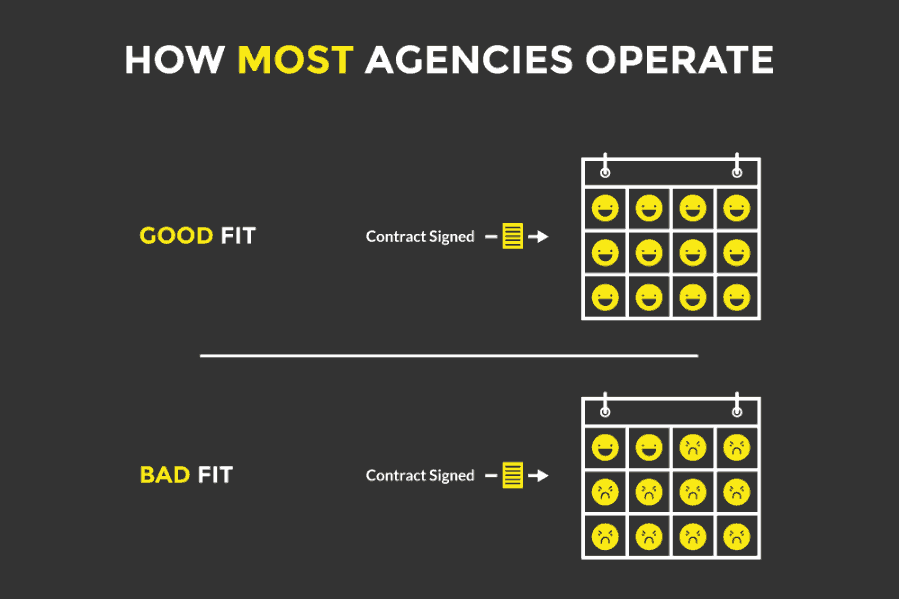
To put it simply: This is a busted-ass model.
It’s rooted in the idea that agencies want to try to stabilize their cash flow and workload and also mitigate some of their risk and cost associated with onboarding new clients. That makes sense, to a point. But, they’re shifting the burden onto the client without providing any sort of reason why the client should have to bear it.
Unfortunately, it’s often a case of mismanaged expectations. Agencies sign new clients with massive promises for over-the-moon results without having to worry if they can actually deliver–because the contract says they’re signed on for 12 months either way.
It just doesn’t seem fair or smart for an agency to operate this way. We wanted our agency to put expectations and fit above all else. We wanted to focus on finding the best clients for us and to partner with companies that are looking for the exact kind of work we can provide.
So, we’ve decided to start offering trials (not free ones, sorry).
And we made them mandatory.
How our trials work
As part of our policy, every prospective client will work with us on a paid trial project before signing on for a monthly retainer.
Whenever we have an inquiry from a new client who wants to work with us–even if they’re ready to sign a contract on a full monthly retainer–we do a trial first. If we reach out to a potential client about working together, we propose a trial project to try things out.
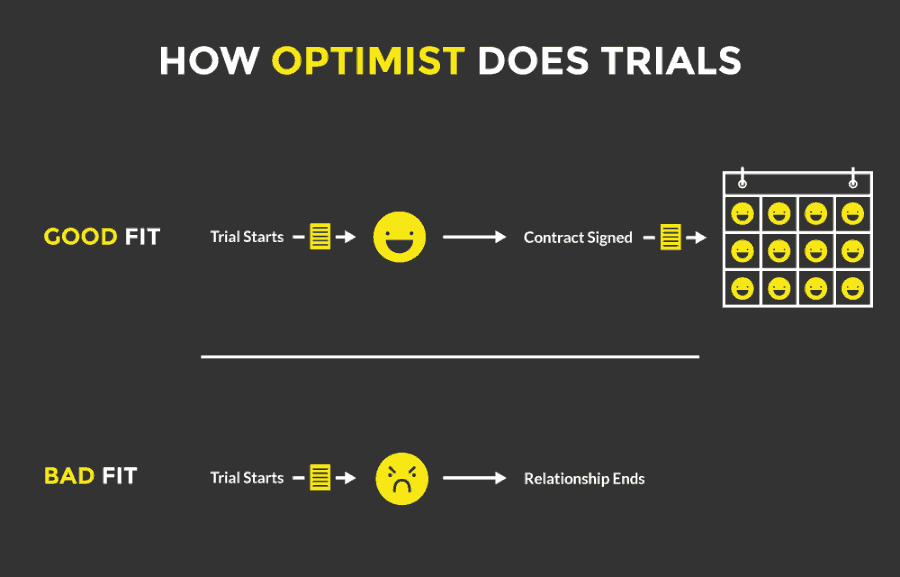
The trial is a bit different for each client, but essentially, it boils down to a one-off, flat-fee project with a specific scope. Generally, it takes somewhere between 1 to 3 weeks from the kickoff of the trial through to the actual completion.
In that time period, we get a chance to work together, see if there’s a fit, and get to know each other on a professional (and sometimes personal) level.
It helps us focus on long-term health of the company
Let’s be clear: We’re a startup. We’ve been around for just a few months.
And like most startups, we’re cash strapped and hungry for revenue.
So, why would we postpone a contract in hand in order to do a trial project first? Because it forces us to find the right people to work with and to evaluate the potential for a sustained relationship with each client.
Taking on work with the wrong partners jeopardizes the long-term stability of our company. For an agency, losing a client is much more painful than simply not signing a new one. It means cutting work for your team, tightening the belt, and possibly reorganizing your entire company.
We want clients that we can work with for a long time, so we need to focus on building and fostering those relationships while weeding out the ones that aren’t right, even if it means giving up some marginal revenue in the short term.
While other agencies try to mitigate this risk by locking in clients, that really just seems like a shitty way to fix a broken system. It’s masking the symptom but doing nothing to fix the root problem (clients aren’t the right fit or don’t have the right expectations).
Not only does it allow us to focus our time and effort more strategically, but it gives our clients a better picture of what they can expect from working with us.
Our clients get to see if we’re the right fit
Different companies need and expect different things from a content marketing agency. We know that we can’t be everything to everyone.
It’s easy for us to try to communicate how we work and what we deliver through our website, proposals, and in discovery conversations. But until a client actually works with us, it can be difficult to really get a feel for how we get things done and the level of work that we do.
Trials solve for that problem.
Clients can get a good look at the work we do, how long it takes us to get up and running, the quality of what we produce, and any other factor that will be important in long-term relationships.
As someone who has hired agencies in the past, this kind of first-hand experience working with someone is really the first time you get a feel for how things will actually go. Sometimes your expectations are met. Other times they’re not. We try to reduce the likelihood of any surprises for the client.
But these trials aren’t entirely altruistic. It also helps Optimist in a big way, too.
We save ourselves from shitty clients
There’s no point in beating around the bush. Trials are important because they help us avoid entering into relationships with clients that don’t jive with our culture.
They may be overly demanding, difficult to work with, or just have the wrong expectations about what we can and will deliver. Whatever the case is, doing a trial project before signing a long-term agreement helps us mitigate the risk that we enter into a working relationship with a client that just isn’t a good fit for us.
Anyone who has worked at or run an agency probably knows the pain of having a client that’s not a good fit. Everyone knows it. But, usually, nothing happens as long as the client keeps paying their bills. There’s a constant, low-level anxiety that today will be the day the other shoe drops and the client decides to fire you–finally.
It’s weird because you almost start to hope it happens. That is obviously not the feeling you want to become pervasive within your company. And it’s definitely not fun.
We’d prefer to avoid as much existential dread as possible, thank you.
Our service contracts don’t lock clients into a certain timeframe. So, even if we did get in with a bad client, we wouldn’t be legally forced to work with them. But this extra level of protection gives us the opportunity to test out how we like working with them just as it helps them test us in the same way.
All in all, I think our mandatory trials have allowed us to grow more strategically and with the right partners, even if a bit slower than we otherwise would have. It’s been a healthy part of our process and allowed us to both assuage the fears of some potential clients and also satisfy our own need to further qualify and validate the relationship.
I owe it all to the SaaS industry for reminding me that sometimes it’s better to build a relationship rather than go straight for the sale.
Deliberate Agitation and the Complacency Trap
Pubished by Tyler Hakes on March 30, 2017

If there’s one phrase that sends shivers down a startup’s spine, it’s, “that’s how we’ve always done things.”
Throughout the years, we’ve been taught that this kind of blind allegiance to specific business practices or processes is a death knell for companies. It’s the hallmark of stodgy, bureaucratic corporations that are in the throes of a long, painful death.
Most startups and new businesses pledge to never utter these words, lest it signal their own looming demise.
Guys like us disrupt guys like that.
And perhaps many of them won’t–at least for a while.
But in many cases, that’s because they’re simply too young to have established practices and processes. You can’t be set in your ways if you haven’t been around long enough to be set on anything.
When you work alone or have a small team, it’s easy to think that you’ll be nimble and able to change and adapt as you learn newer or better ways to do things. But as you grow, it becomes increasingly difficult. Your organization has drag. Change takes time and costs money.
So what happens when those companies grow up?
In most cases, they, too, will fall victim to the “how we’ve always done it” syndrome.
They’ll wake up one day and realize that they’ve been doing a lot of things the same way for the past month, year, or decade. They’ve trained each of their employees to do it the same way, who in turn have trained the next round of hires to do it just like them.
Or, even worse, they’ll become dogmatic about their own practices, even without considering alternatives.
Startups, in particular, seem to love setting hardline rules for the team. Things like, “We never have meetings–meetings are terrible,” or, “We run 2-week sprints because they’re optimal for performance.”
But has anyone in these organizations ever actually tested these out?
In most cases, no. It’s something they read on a blog or in a business book and took as gospel. Then they baked it into their business, forever and ever, amen.
That’s because doing what we know is easier than doing something different. And in most organizations, change doesn’t happen unless it’s done intentionally.
Complacency is a trap
This is the same trap of complacency that faces corporate teams. Yes, the exact same thing that most startups swear to never fall victim to will often come to dominate the culture of most companies no matter how innovative or entrepreneurial they may consider themselves.
We stick to what we know–what’s comfortable and what works–right up until the point where it fails us in some spectacular fashion. And almost every business is susceptible to this over time.
Because of this, a lot of organizations don’t change until they’re forced to.
The only way to combat this is to plan for change. Plan to change.
There needs to be someone keeping score–tweaking. optimizing, and experimenting. Just as many startups have embraced “failing fast” and “constant optimization” in their marketing or development process, so, too, should we embrace the same mindset about how our company actually runs.
Deliberate agitation
If you want to avoid building a company that gets stuck in its ways, then you need to be intentional about your commitment to evaluating and improving your systems. You need a process by which to improve your processes (meta, I know).
Every so often–monthly, quarterly, yearly (this process is subject to change and improvement just like the others)–set some time aside to take apart a portion of your business. Take a hard look at what you’re doing and ask why you do it that way. It might be your sales efforts, your marketing strategy, your development cycle, or any other system.
Have a transparent discussion with your team about how things work and where they fall apart.
Ask questions like:
- How long have we done it this way?
- Why did we start doing it this way?
- Why do we keep doing it this way?
- What are the benefits of our current approach?
- What limitations or drawbacks do we face with this approach?
- Are people happy with how we’re doing it?
- What are the opportunities for improvement?
- Is there a different approach we could take?
- How would changing this change other things?
I think of this as deliberate agitation–like a snowglobe.
You let things settle into place just long enough and then shake them up. Watch to see if they fall into the same patterns or if something new and better emerges. Sometimes, you decide that the way you’ve been doing things is great and there’s no need for change. But it’s the act of looking that uncovers opportunity.
You deliberately and intentionally question things and change them before they become a problem. You remain vigilant in trying to improve so that way you don’t fall into the trap of complacency that leads to eventual failure.
Of course, too much change can make an organization unstable. You don’t want to switch up your internal folder structure every 2 days or radically redesign your product lifecycle every week. But, revisiting these systems and processes with some regularity can force you out of complacency.
It forces you to think critically about what you’re doing and why you do it.
Asking why
One of our founding brand values at Optimist is to always ask why.
It might seem trite or even cliche. Plenty of companies probably claim to search for knowledge or understanding in the things that they do.
But, for our part, this manifests itself in a process of deliberate agitation. It means that we constantly try new things, experiment, and question not only what we do but the way we do it.
This touches everything from how our team collaborates on client work to our project and task management systems and even our compensation structure and incentive programs.
For us, the point is to keep a healthy skepticism about the things we do and to be open to trying new ideas or methods that may help us in the long run.
Acting with intention
The greatest thing that comes from a process of continual evaluation is that you eliminate systems and processes that existed just for their own sake.
Actions take time (AKA money) and should serve a purpose.
Without purpose, we’re doing stuff just to do it, with no sense of whether it’s really what we should be doing. So, it’s important to adopt a mindset that’s built to evaluate and change our actions based on data and feedback.
When the things you do all have a clear purpose and clear validation, then they’re being done because they should be done, not just because they’ve been done in the past.
This is acting with intention.
It leads to better companies, better teams, better processes, and better people.
Tell me I’m wrong
I would be hypocritical to proclaim my own thoughts on this topic to be the end of the discussion.
This is, of course, my viewpoint. And I’ve tried to express it well.
But, I also want to hear from you. Share your thoughts, experiences, and ideas about how you build systems and processes to help your team do their best work.
This is Optimist: Our First 3 Months + Our Plan to Reach $1,000,000 in 1 Year
Published by Tyler Hakes on March 07, 2017

Optimist has now been a thing for three months.
I can’t decide if it seems like a decade or a week, but either way, each day has been a new adventure. I’ve already learned a ton and I think our team has felt both the ups and downs of starting something new.
We’re starting to settle into a rhythm for our client work and also figure out a cadence for our own promotion. There’s a long way to go, but we’re making progress. So, it felt like the right time to make a post about the innerworkings of our agency and share a bit about what we’re building.
Trying to build the future
Since this is the first in this series, I want to start by taking a step back to introduce the idea behind Optimist and what we want to do and how we are hoping to do it.
Optimist is an agency for the 21st century.
We’re focused entirely on providing full-service content marketing (from strategy/management to creative, promotion, and distribution). But we’re doing it without a full-time staff.
Instead, we operate as a collective of remote freelancers, each bringing their unique skills and talents to the team and giving us everything we need to meet the needs of our clients.
Benefits
Of course, not having a full-time staff also means that it costs less for us (me) to start up. There’s less overhead and risk.
But, that’s not the only reason I’ve chosen this model.
- It just makes sense in the modern world
- Everyone feels more like peers versus a traditional hierarchy
- We aren’t confined geographically or limited by salary
- Our team is agile–able to be reconfigured based on client needs
Challenges
This kind of agency also presents its own challenges. We need greater buy-in from each of the team members–they have to feel invested in what we’re doing and have a reason to care and remain committed to our work.
I believe that the way to accomplish this is not through strict deadlines or forced quotas, but by giving each member of Optimist a seat at the table to decide our direction and to have ownership over the work that we do.
This means that members are able to choose the work that’s meaningful and exciting for them, and also have a financial stake in our success.
We’re building an agency on the premise of collective good–for us and for our clients.
Our first 3 months, by the numbers
We officially launched Optimist about November 28. So, for the sake of simplicity, I’m going to say we’ve been around for three months. (Close enough, right?)
In that time, we’ve accomplished a lot. But, as most business owners, I never feel like I’ve done quite enough. Either way, let’s start with a recap of what we’ve seen happen so far in these first 90 days of existence:
- 5 posts published
- 8 guest posts published
- 756 email subscribers
- 10 inbound sales leads
- 70 outbound sales emails
- 1 outbound sales lead
- 3 paying clients
By the numbers, I feel pretty good about what we’ve accomplished. But, I know we need to do more to get to where we want to be.
Our current position
First of all, the good news is that we generated 10 inbound sales leads in our first 90 days plus interest from one outbound pitch–that’s 11 total leads in 3 months.
This is huge.
Honestly, I didn’t expect such a big response this early. (And when I say an inbound sales lead, I’m talking about literally receiving an email from someone saying, “I’d like to hire you.”)
Not all of the inbound leads were a great fit for us. In fact, I turned down or referred most of them to another partner. But that’s fine. We still landed 3 paying clients and 2 more that are currently at a proposal stage and could be signed by the end of March.
It’s worth noting that not all of our current clients are our “ideal” client. We’ve been asked to do some project and trial work, building into a relationship. This work is nice and generates revenue, but it’s not our ideal scenario, which is a retainer client for ongoing work.
Either way, we are on track to possibly have 5 paying clients by the end of March, which would be a monstrous start.
We have pricing stated right on our homepage. So having a prospect email us looking for services means they see tremendous value in what we have to offer. They’re not just looking for a bargain.
On the flip side of that, we have not done a great job in every area.
I think that the most obvious place where we’ve been slow to execute is on our own content. We’ve hobbled together 5 posts, but we haven’t fully executed our own content marketing strategy as well as we would for a client. This is almost entirely my fault, as I haven’t utilized the team or prioritized content as part of my own schedule.
I’ve flirted with outbound prospecting and other marketing and sales channels to try to help boost our visibility in the short term. But, I’ve found that content and inbound leads seem to work best for us.
Over the next few months, I want to dedicate more of my time and resources to our own content, guest posts, and other activity to generate inbound sales.
Clients and sales
So far, almost all of our work and inquiries have come from inbound sales leads.
Compared to the 10 inquiries we’ve received directly, we were only able to generate 1 lead through outbound sales pitches to targeted groups (specifically startup companies that had raised funding).
Inbound leads
Of our total of 10 inbound sales leads, 5 of them have been a good fit
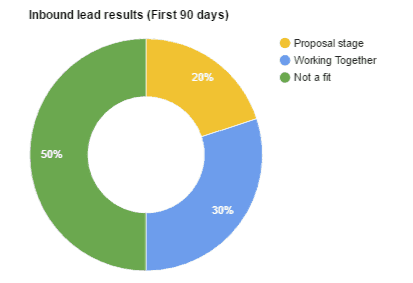
This is obviously good news.
First, we have been able to generate inbound interest. And, secondly, we’ve been able to qualify almost 50% of those inquiries as being a good fit.
Outbound sales
I think our first 90 days has taught us that inbound sales opportunities will ultimately be better and more lucrative and that outbound selling is not an efficient use of time and energy. (Or, maybe I just suck at it.)
Throughout the first few months, I put together a few targeted lists of prospects based on specific criteria:
- Growth-stage companies
- At least $1.5mm in funding
- Interesting/exciting business
- Clear path to growth through content marketing/SEO
I pursued a number of obvious strategies like targeting companies soon after they announced a Series A or contacting companies with full-time job listings for related positions.
The response sucked.
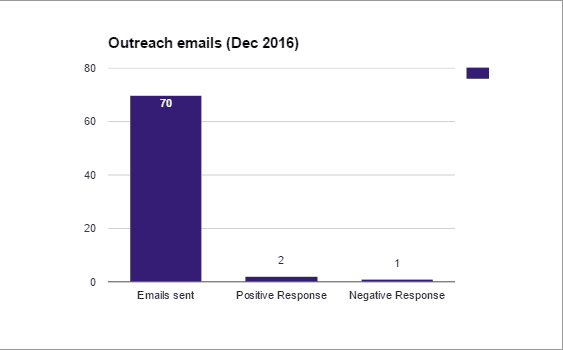
All told, I sent over 70 emails and got 3 responses. One was an opportunity, but it as spurred by a connection that I had inside the company (did not lead to business), one was a polite “no thanks”, and one led to a call (the client is interested, but not ready to buy).
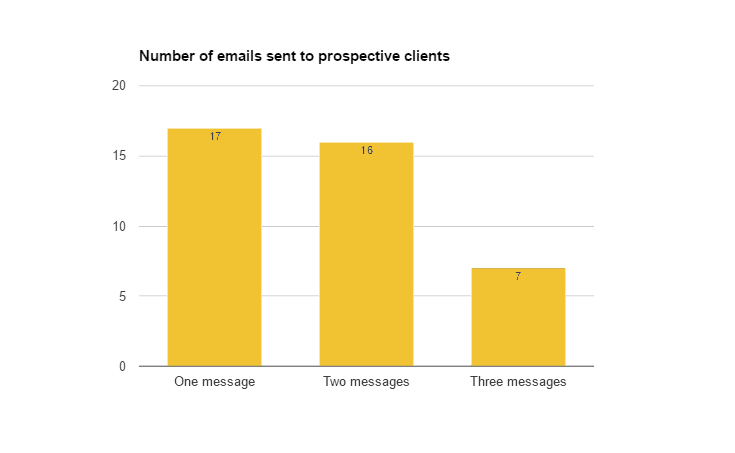
I didn’t just fire off one email, either. In most cases, I tried multiple times to contact people–and sometimes attempted to contact multiple people within the same company. The responses that I did get (all three of them) came after just one message.
For the time being, I am going to cease outbound sales efforts and focus on the activity that will help us continue to generate inbound leads.
Sales and revenue
To date, we’ve generated nearly $20,000 in revenue.
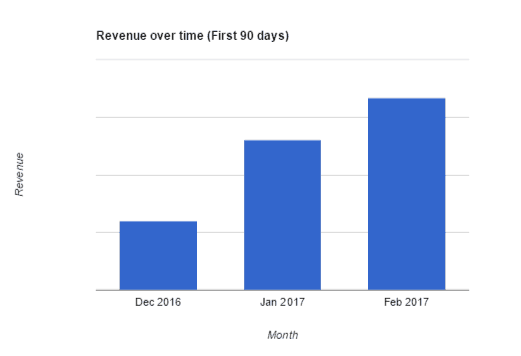
In the future, I am planning to share specific data on revenue and cash flow, but because the sample size is so small at the moment (with 3 paying clients), I’ll just show relative growth for the sake of anonymity of our clients.
People and operations
Part of getting up and running in the past few months was finding the right talent to populate our team.
We are in a pretty interesting place, because we have ambitions to scale our available work pretty dramatically, but we only have a few clients right now.
So, we’ve solved this by essentially compiling a “roster” of freelancers. There’s no committment involved with being on our roster but everyone is added to a Slack group where we’re able to discuss new opportunities and get to know each other. Then, when we have the right work available, we can assemble a team for that client and get started almost immediately.
As of today, our roster contains:
- 2 content strategists/managers
- 3 writers/editors
- 2 designers
- 2 marketing admins
We’re looking to add some additional help over the next few months as we start to ramp up operations.
From an operations perspective, we have a pretty simple tech stack:
- Trello – Project/editorial management
- Google Sheets – Editorial planning
- Slack – Team communication
We can already see that there are limitations and we are planning to soon start experimenting with task and project management software. I’ll probably write a separate post on our findings there and how we build a system that works for us.
From a content marketing perspective, we’re using Ahrefs and Moz as our primary tools for keyword, content, and outreach data.
Year 1 goal: $1,000,000
The main goal for Optimist in 2017 is simple (but not easy): Build a $1,000,000 agency.
For us, that means signing 10 retainer clients to $10,000 per month contracts. That would give us $100,000 MRR and a $1.2 million run rate.
10 clients * $10,000/mo = $1.2 million run rate
This certainly seems a bit ambitious, but I think it’s very feasible if we maintain and build on the momentum that we’ve generated in the first few months. Even if we hold steady at the same number inbound sales leads for the rest of the year–about 3 per month–then we would only need a 28% close rate to reach our goal. And that’s without considering the work we’ll be doing to increase the number of inquiries that we receive.
My full list of goals for the year looks like this:
- Sign 10 retainer clients, estimated $100,000 MRR
- Publish 40 articles on Optimist
- Publish 24 guest posts/columns
- Book 4 in-person presentations or workshops
- Host at least one joint webinar with strategic agency partners
- Build a list of 5,000+ email subscribers
- Donate $5,000 to charitable causes
I’ll be publishing regular updates to the agency journal, so subscribe below to follow along as we make the journey to $1,000,000.